#because the default assumption of that word is negative but sometimes I just mean it as cause and effect
Text
you guys know stuff can just be neutral right. like it doesn't have to be good or bad it can just Be ykwim like sometimes an experience is Weird but that doesn't necessarily imply that it was good or bad sometimes things are just so unfamiliar that the sheer novelty overrides having an opinion about it. sometimes you hear someone's died, but it's no one you knew or would ever know and it's so many degrees of separation from the source that they have no emotional investment in it either and that's not automatically a tragedy OR a relief it's just a statement of fact.
sometimes stuff just Is. and it's okay that it is.
#i often preface statements or questions with 'this is morally neutral'#especially when I'm using words like 'manipulate'#because the default assumption of that word is negative but sometimes I just mean it as cause and effect#I know a lot of people ask questions that have An Answer and if you say the wrong one you are bad#the classic like how does my ass look in these jeans or do you think [third party] is attractive#or even where do you want to have dinner but we will end up at a specific place regardless#anyway so many people do that but they spoil the questions for like decent normal curious people#sometimes I feel like I have to be like i am not emotionally invested in a particular answer#sometimes you feel the exact same about every choice and it's genuinely about what's true#a lot of people don't really care about what's true though
11 notes
·
View notes
Note
In regards to your addiction post: I've often seen fic that portrays siblings commenting negatively on Klaus addiction as rude or not understanding. What's your take on this?
Let’s look at those times when the others actually address Klaus’ addictions, and I’m gonna leave out Ben because I already wrote a lot of words about that relationship.
- Luther stops Klaus from stealing from Reginald’s office so he can buy drugs. Luther doesn’t insult him or shout, just doesn’t let him get away with theft. Klaus’ response is, initially, to play innocent. After he’s called out a second time, he drops everything while mocking Luther. I’ve seen this moment reinterpreted many times as Luther shaking Klaus down on an unfair assumption, chiefly because Luther is the character who is most often made into the hate sink in people’s fics. But I don’t think this would have happened if there wasn’t a very reliable pattern of behavior. Moreover, people tend to overlook Klaus’ behavior in this scene, which is considerably ruder. I mean it is by default, because he is stealing, but he's also ruder in the other ways.
- Allison calls out Klaus for being high during the first family meeting. Her exact words are “You’re high?” No insults, just clear frustration as she is the first to name the elephant in the room. Or. One of the several elephants in the room. Klaus laughingly responds in the affirmative.
- Luther tells Klaus to sober up because he needs his help. His wording is informal and blunt because he's giving an order, and some viewers take it as an indication that he's a massive dick...even though he's conditioned to take the lead and has been expected to do so for, as far as his experience goes, their entire lives. You don't put flowery words and pleases into an order. They have to be short and to the point.
- Five expresses utter amazement that the world is ending and all Klaus can think of is getting high. Then calls him useless. This is the first time Five is really faced with how much addiction has taken over his brother’s life. Moreover, he follows it up with “you’re all useless.” Five’s (bad) takeaway from this episode is very much that none of the others can help him (since they already died trying to fight the apocalypse before) and he has to save them all himself.
- Diego has what’s probably the second-rudest response to Klaus’ drug use that we see from the others, complete with a couple of dope slaps that are typical for siblings. He refers to Klaus’ habit as “just weakness,” but this doesn’t mean he believes it, necessarily. Sometimes, you just say shit to see if this will be the sentence that sparks a response. Ben does this a lot, too. It is not the way to go about successfully motivating someone to get sober. Klaus responds exactly how a sibling getting hit by another sibling always responds—by escalating rapidly to furious screaming.
- Diego expresses concern and support for Klaus getting clean before helping him go about it in the way he asks. He is calm in this scene, and very much not calm in the last scene, so his approach is very different until he gets emotional again. Of note here is that when Klaus tries to use Eudora to bargain with Diego, Diego gets (understandably) extremely angry, but makes sure Klaus is secure and walks away to cool down. It’s not a great safety practice to tie someone to a chair and leave them alone in the room, but punching him would be even more likely to hurt him.
- Luther begs Klaus for drugs. Because everyone makes great decisions when they’re drunk. Luther thinks Klaus “seem[s] so carefree,” which some people take as him claiming Klaus never suffered, but that doesn’t make sense. He’s asking for drugs because he is suffering. That is the purpose of drugs, to him. He seems to think the drugs make Klaus carefree, not that Klaus' trauma is invalid. Klaus’ answer is unequivocally no because his way of living brings roughly as much suffering as he’s trying to cover up.
- Five tells Klaus he’s not really sober and that he’s kidding himself because he’s still having visible withdrawal symptoms. Rudest anyone is to Klaus about this, and honestly, it is really shitty. Thing is, it’s this exact conversation that makes Five realize his disgust with Klaus’ addictions is tied to his disgust with his own. That’s probably why he’s so harsh in this scene—he’s expressing his anger toward Klaus and his repressed anger with himself. Still, I’ve had something like this happen to me, and it sucks, so don’t do it.
- Klaus shows up at Allison’s house very drunk. Allison looks gutted, but invites him to sleep on her couch and covers him with a blanket. The impression I get here is that she’s been enjoying having a real relationship with him again. She has been alienated from all her friends and her husband, and now she’s essentially lost Klaus again, too.
- Allison talks to Klaus about why he relapsed and listens to him, which is awesome. Then she joins him, which isn’t awesome. But at least he’s safer drinking with someone who is capable of dialing 911.
- Diego refuses to hug Klaus because he’s smelling some serious liquor on his breath. Understandable.
- “Overdosing, probably.” I’m okay with this because this moment is so damn Royal Tenenbaums and David’s monotonous delivery of the line is magnificent. Sometimes, you need to respond to the show, tone included, instead of trying to transplant fictional events into real life and then interpreting them. Kind of like interpreting a language. Context matters.
- The only time someone accuses Klaus of being high when he isn’t, to my recollection, is when Ben is possessing him. I think that one is understandable. The other times the others judge him to be high are times when he is high, unless I’m forgetting something.
#tua#the umbrella academy#klaus hargreeves#luther hargreeves#diego hargreeves#allison hargreeves#five hargreeves#vanya hargreeves#ask answered#tua meta#tw: alcohol#tw: addiction#tw: drugs#viktor hargreeves
167 notes
·
View notes
Text
“If you want to romance [same sex love interest], just roll a[n opposite sex] PC! You’re so greedy to want [additional romance option] when you already have [singular same-sex romance option]! Some people are just straight and you should just deal with it! You should respect the WRITER’S VISION!”
Not that it’s news, but dear. GOD. do I hate it when people start arguing this shit. Because really. Do you think that it’s news that “some people are just straight”? How the fuck is it greedy to want to have even the little bit of a crumb that ONE more same-sex romance option would offer, when the slice of pie that heterosexuals get is 99% of the whole damn thing? Why do I have to give up a part of my identity to play the romance that connects to me?
And you know, sometimes, that really is the kicker for me. That so many people just don’t seem to get the power and importance of experiencing a story in a way that validates your identity is. And it’s generally because they don’t NEED that validation.
I mean, I think back to my first play of Jade Empire, the first game I played that even HAD a same-sex romance option. And looking back on it from nearly fifteen years after that first run, I can tell you, it is VERY flawed as a result of that whole “the game came out in 2005, same-sex romance is still something that inherently gets the M rating” side of things. But despite all the reason I have from today’s perspective to say “this isn’t as good as it could have been if it had been released a few years later,” it’s still one of those things that just inherently makes me feel SEEN.
So why do I have to sacrifice that, just to get the romance option who fits right with me? Straight people ALWAYS get to be seen - hell, usually, they don’t even QUESTION when a romance is default into the story. I’ve never seen the straights argue that, say, Ezio’s relationship with Sofia is shallow, or that we don’t know enough about a character like Randvi. Straight people didn’t argue that there really wasn’t much reason for Starkiller to fall so in love with Juno that he’d just automatically go back for her on the Ecliptic. Mario’s motivation is so often Princess Peach, and no one asks for the relationship to be developed, it’s accepted as just a default THING. To say nothing of how many games offer optional flings, but, if they even allow same-sex encounters, which is no guarantee, the male options are significantly fewer, so it’s clear that the expectation is that a male PC is taking every woman around them to bed, not that gay people are playing.
Or, sticking to BioWare, the straights don’t mind that Liara is shoved at Shepard every chance BioWare can arrange, her relationship with Shepard emphasized over all others. Leliana has a romance mechanic so obtuse that offering her kind words can get you locked in. Both have instances of bugs where there’s an assumption of romance, and no effort has ever been made to fix them (leading me to want to put the word “bugs” in quotes...). Peebee sits on Ryder for an uncomfortably long time and unless Ryder’s played a romance through to its conclusion beforehand, will explicitly offer a hook up with Ryder.
Or we have a game like Cyberpunk, where Panam has no real, clear cut “I’m not interested” option, with a lot of assumption that a male V is romancing her from everyone around them. Meanwhile, the one gay romance in that game is not only gated behind so much in the way of progression barricades, you could be forgiven for missing him entirely, AND is framed in a way that has him still hung up on Johnny over anything else.
And there’s the fact that it’s ALWAYS same-sex romance content that gets cut. How many times have we heard about “[character] was going to be a same-sex romance, but we had to make cuts for time”? Saying nothing of things like Jacob and Jack’s same-sex romances getting cut in ME2 because of negative press from freaking Fox News...
But no. It’s always us gays who are being greedy, being demanding, being ungrateful because we didn’t HAVE to be included, and it’s just... You people just can’t seem to conceive of the fact that people not like you have to fight and drag every moment of representation we get on screen.
And they don’t listen, either. All the explanation I just poured out here, if I repeated it to any of the people who hurl this shit at any of us angry queers complaining, they’d tune out before I finished my first paragraph.
This is all just so EXHAUSTING.
32 notes
·
View notes
Photo
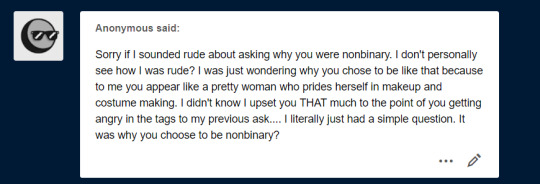
Okay, here’s a final answer, just for clarification -
-
Firstly, please understand that I’m not angry, and I’m not upset. I just tend to speak very matter of factly, I guess? If I seem cold or something when typing this response, it's not a personal attack towards you or some display of aggression, that's just how I word things sometimes, I don't mean for them to be misinterpreted or want you to think I’m like getting mad with you or etc. Me disagreeing does not inherently equal me being mad about something, it merely means that I disagree, which is an emotion neutral action. If someone said 2+2 = 6, I would disagree, and openly so, but that doesn’t mean I’d also be like, crying about it or upset with them or something lol.
I actually even stated so at the end of my tags last time -

So, I apologize if you interpreted my tone as being mean, but I was simply trying to be firm and direct in how I said things so you understand that it's a very serious matter, and I didn't want to be light about it.
There was a bit of jokiness/sarcasm/exaggeration as well I suppose, but again, that’s not an inherent indicator of upset, just the way I speak - especially when your question can be seen as rude to begin with (which usually leads people to care less about faking positive emotions or seeming polite to others. If a person is not polite to you, you’re not likely to watch how you communicate as much or attempt to display high politeness back). My default state is a neutral flatness as I have a very shallow emotional range (shout out to schizophrenia spectrum negative symptoms and other various issues lol), any excessive positivity or “perkiness” or something that I display is just an attempt to be polite and communicate with others in a simple and kindly manner (in real life I’m often seen as too stoic, blunt, detached, cold, etc. lmao, so in general communication with strangers I tend to overcompensate to being excessively polite instead) - but that also means I can accidentally drop that sometimes if I’m being “real” or whatever.
-
Anyway, now that concerns over my tone have hopefully been explained, I’ll address this issue about your previous ask in a numbered list. Please read ALL of this, if you are actually taking this seriously. If you don’t actually read, in detail (no skimming), this entire response, then this is not even a discussion since you’re not willing to genuinely engage in the first place. -
-
Firstly, here is the original ask, for reference ----

As for how your question can be rude:
(1.) In my initial response (in the tags of your answer), I asserted various things, mostly that the question was rude, and that it’s not appropriate to ask people, for a variety of reasons. I’ll explain those in more length here.
My main point is that even asking the question in the first place is rude. It doesn’t matter how specifically you word it, it’s not appropriate. Just like any personal issue. At least in my culture, it’s typically thought of as inconsiderate and inappropriate to ask random strangers personal questions. for example, it would be rude to approach a random stranger on the bus that you’ve never even seen before and ask them why the have the haircut they do, who their sexual partners are, if they’ve just had a death in the family, how well their marriage is going, what their gender is, etc. etc.
-
-
(2.) On top of this personal boundary issue, another concern would be that the nature of the question itself is baseless --
Would you ask a cis woman why they're a woman? Or a cis man why he chose to be a man? Would you ask a straight person why they chose to be straight?
Would you find it acceptable and polite if a random stranger approached you on the street and asked you for an explanation as to why you're the gender you are? Imagine that exact scenario happening to you, and if you would find it odd or overstepping boundaries at all.
I doubt you ask this same gender identity question to everyone in your life, to your parents, friends, the cashier at your grocery store. Why is it only certain groups that need to explain or justify their identities to you? Only certain groups that you feel the inherent need to question? It's a double standard which further serves to prove the question itself is unnecessary.
-
-
(3.) Additionally, in case you're genuinely unsure of tone (maybe you have difficulty reading social cues or something, that’s understandable) I will explain - the way in which the question was asked has certain implications.
The statement “Why are you nonbinary? You seem like a pretty girl to me”, implies that - due to your beliefs about me/how you see me, you find it confusing that I could have a certain identity that you see as not matching your perception of me, or that you see as an invalid label, and are asking for me to justify or explain myself/my identity to you because of that.
Even if this implied meaning was not intentional, it is what most people will interpret upon reading the question, and would be a commonly held understanding. There are other ways you could have asked the question which would be less condescending, yes, but again, the other points still stand (like that the question in itself is impolite to ask to strangers, etc.)
Again, revisit the imaginary scenario of a stranger approaching you on the street and asking you why you’re the gender you are - would there not be some of this implication present? For example, say you’re a man - would it not feel as if someone were questioning your manhood, or implying you weren’t truly a man, or must not be a man ‘correctly’, or that ‘man’ is not a valid label for how they see you? Why else would they approach you and ask you in confusion for you to justify your identity to them? The implication is that they don’t see you as a valid man, or at least not how they see a man, and thus are having a hard time accepting that someone like YOU could ever be a real man - that it’s hard for them to believe you are what you say you are, because they see you differently.
-
(3.a) As an additional sidenote (one which I addressed in the tags replying to you initially), your ask (as well as this more recent one) also made certain assumptions. There are plenty of people who ''look like girls'' or 'look like boys' but aren't as they “seem”, even if you're someone who only believes in a “binary biological sex model” (I’ll include some links at the end about this). It's strange to assume someone's body parts or identity just based off of pictures you see on the internet (which often have specific lighting, angles, or in the case of many people are even edited and etc. I don't do this but it's really common nowadays with phone editing apps and stuff). Just because I appear a certain way to you, in no way implies that I have the physical form and traits you assume I have Consider how you may feel invalidated or uncomfortable if people sent you messages assuming personal things about you that are incorrect or that they have no way to possibly know.
Your standards and perception are also not universal, various cultures and groups have different ideas about what outward traits would make someone considered a “man” or a “woman”, so making your judgement of someone else’s identity based only on your own (extremely shallow, since it’s only from online pictures) perception of them, is also inherently a bit flawed.
-
(3.b-ish side tangent) In extension to this, your ideas and how you view me are likely incorrect. Just as it is similarly true that, from afar, any assumptions I make about you would likely be inaccurate as well. We are strangers.
For example, if you really knew me, you would know that I don’t pride myself in costumes and makeup - It’s a fun creative activity for me definitely, but I feel no pride over it, I don’t do it to look good or seem a certain way, and actually I resent it in a way, because often it feels like people mostly only pay attention to blurry pictures of me looking silly in cheap wigs, but don’t give that same level of engagement to the other more important things I do that I personally care about 100x more, like my worldbuilding and other projects lol. Absolutely nothing against the people who like my costumes, I appreciate them of course!!, and I still love doing costumes - BUT, to imply that it’s a primary source of pride in my life or a characteristic that defines me over other things, would be a mischaracterization.
Anyone who knows me in real life would certainly list a million other stand-out traits to define me, rather than ‘pretty make up woman’ (most people I know in real life would also not describe me as ‘pretty’ or as a ‘woman’, just for reference lol).
Your one sided perception of me (which I’ll address in the next section) may allow you to have a shallow idea of me as some sweet pretty costume girl or something, but just know that the reality is more like: I haven’t had much time lately to do costumes because I’m working on a game and other art which I see as much more important, I haven’t bathed or brushed my hair in weeks because of mental illness/functioning issues, 99% of the time I’m not ‘’dressed up’’ - I wear the same pajamas and cardigan that I’ve worn for the past 3 years and barely wash to the point that it’s disintegrating and leaves fabric scraps around the house lol, I have a little moustache right now and a unibrow and other “””non-womanly”””” traits (at least by common media western standards, which is what I assume you go by), I’m excessively analytical, detached, and in real life you would probably see me as blunt and cold and cynical (also commonly missing social cues) - as well as being hugely asocial/ a hermit and mostly lacking the ability to form attachments to others (So definitely not ~pretty and cute and approachable~ ghgg), I have obsessive compulsive disorder and am regularly so anxious that I’m throwing up and have various other issues - I’m also not Fun or Cool or Spontaneous because I’m too busy being rigid and high strung lol (even before the pandemic, I don’t like to leave the house or interact much at all with others, I’d rather be in my little controlled environment where I don’t have overwhelming sensory information and distractions raising my anxiety constantly),, and my favorite activities are literally all just stuff like pacing around my home alone talking to myself in different voices creating gods and fake religions for my fantasy worldbuilding while I eat boiled cabbage and light little pieces of paper on fire over a candle to help me think - not doing makeup and other Pretty Woman Things.
Which I don’t want to be too harsh or focus on this tangent too much, since obviously as you don’t know me in real life, these are all things you couldn’t possibly be aware of, and it simply comes with the territory of posting publicly online - so I absolutely don’t blame you for perceiving me incorrectly. If “pretty” pictures are all you see, then that may very well be the only impression that you have. I just personally dislike this certain interpretation some people have seemed to have of me (you’re not the first person to think of me as a Pretty Makeup Girl or whatever lol), since it’s so completely opposite from the truth of who I am, I feel the need to explain it like this sometimes. Just accepting the false perception some people have of me without any argument feels disingenuous and like supporting a version of myself that doesn’t exist.
So anyway, no issue with you personally, but just trying to set the perception of me straight a little more accurately lol.. now, back on topic --
-
-
(4.) Lastly, and here’s the main thing I’d like to stress, there's the issue of personal boundaries. Again, you're a complete stranger to me, I don't know who you are, and you have no idea who I am. Even if you've followed me online for years and read every post I've ever made, you still have no idea who I truly deeply am, only a vague scattering of snapshots over time.
-
Here are some definitions for Parasocial Relationships:
“Parasocial relationships are one-sided relationships, where one person extends emotional energy, interest and time, and the other party, the persona, is completely unaware of the other's existence. Parasocial relationships are most common with celebrities, organizations (such as sports teams) or television stars.”
“Parasocial interaction (PSI) refers to a kind of psychological relationship experienced by an audience in their mediated encounters with performers in the mass media, particularly on television.[1] PSI is described as an illusionary experience, such that media audiences interact with personas (e.g., talk show host, celebrities, fictional characters, social media influencers) as if they are engaged in a reciprocal relationship with them. The term was coined by Donald Horton and Richard Wohl in 1956. “
-
This is all anyone can ever have with people they follow online. You can perceive them, but you cannot know them or truly understand them. I think this is very important to remain cognizant of in such a massive social media age, as often times people are fostering one sided concepts that are inaccurate or unhealthy (no so much with just you sending me a simple ask, but in a broader sense, how people act towards celebrities, other bloggers, etc. etc. seems to have little boundaries, and often results in a similar manner with people forgetting to maintain acceptable boundaries with those they follow or know about from afar).
-
-- This next part is very important, I think it’s a super valuable way of thinking about this sort of stuff, so if you take away nothing else from this, at least remember this next portion --
A very good way to think about online boundaries that I heard someone mention in a post once (though I can no longer find the post), is to take whatever you're going to say to someone online, and imagine saying it in person, in real life, to a barista. Before you send an ask or make a comment, think about if it’s something you would really genuinely say face to face to a stranger.
Would you walk into a random Starbucks and ask the dude at the counter a bunch questions about their gender identity? Or about his personal life in general? You probably recognize that that would be strange and socially inappropriate. It's similarly inappropriate in a case like this.
Even though you may feel a sense of familiarity with someone online from reading their social media posts, or even speaking to them once or twice through asks and etc. etc., at the end of the day you don’t really know each other much more than you’d know a random stranger.
Unless someone is inviting personal questions (like by reblogging those ‘ask me anything’ posts or etc.), or has the sort of blog where they are commonly asking people about/discussing their own intimate personal experiences or etc. (mine is not this way), then questions like this are very out of the blue and similar to asking a random person working at a store things like that. It can be seen as rude and inappropriate in general to give those sorts of questions to people who are complete strangers, and typically comes off as crossing personal boundaries. Again, think about a random stranger asking you these questions, and how you may perceive it.
-
-
In summary:
1. The question itself is borne from an double standard and isn't very good to ask in the first place. 2. The way you asked the question was worded with certain implications. 3. Your ask is also assuming certain things that you don't know are true, which can be uncomfortable for some people. 4. Even were it not for the three other things, it's commonly considered rude in many cultures to ask serious questions about the personal details of complete strangers, even if it's online. It could prove useful to utilize the ‘barista test’ to better determine this in the future.
-
-
Final Thoughts:
Anyway, I wasn't mad and I have no beef with you or whatever lol. Hopefully you can understand what I mean. I've also explained myself as well as I think I can though, so I don't feel like discussing it any more and won't respond to further asks about this. I have a lot of things going on in my life right now (as I'm sure everyone does given the pandemic and everything, you probably do too, so hopefully you can empathize with that), so I’d like to limit my time spent online, especially discussing topics I already don’t like to discuss or am not open to accepting questions about (I just want to talk about cats and elves and stuff lol).
If you still can't at least kind of get where I'm coming from then it's perfectly fine to just agree to disagree. If aspects of myself upset you or cause you discomfort, then there's no harm in just unfollowing me or something! Or if you don't even follow me, I would encourage you to block me so my posts no longer come across your dash (or block/unfollow me on whatever other social media you may be seeing my posts on ,etc)., etc. That way you don't have to see content or hear from someone who makes you uncomfortable that way, and there also won't be any need for this to come up in the future. Part of using the internet in a healthy and productive manner is to know when to disengage with certain content and just cut it off/unfollow/block people/etc. if it’s causing you unnecessary conflict or distress, or makes you uncomfortable or etc. to look at. Thank you for the question! Hopefully this response explained things a little better.
-
-
Links and Further Info:
On the off chance that you were genuinely curious, here are some resources where you can learn more about people of different gender identities and also hear them explain their experiences, etc. Since these people are actually openly discussing their experiences/making educational content and are obviously actually open to talking about it, that would be a better place to field any further questions or learn about things. :3
Here’s some reading -
Understanding Nonbinary People (link)
Gender Variance Around the World (link)
12 Questions About Nonbinary Gender Answered (link)
About the Sex Binary (link)
Ask LGBT subreddit (link)
one ‘ask a nonbinary person’ blog i found (I don’t know if they’re still active, it’s one of the first ones that came up for me lol, but I guess could be helpful) (link)
-
And here’s some videos with people talking about their experience, or being educational -
(NOTE: I just did a quick google search and did not deeply research these people and their entire histories and etc., so I can’t say I stand by literally everything they say or know what type of people they are, but it’s just a general place to start~!)
A video examining the idea of gender in general and how it even exists and nonbinary people (definitely interesting to watch) (link)
video about nonbinary gender/explanations (probably at least watch this one too) (link)
What is a nonbinary gender? (shorter general info) (link)
answering all your nonbinary questions q&a (link)
Video about binary sex/gender/etc. (link)
5 nonbinary people explain what nonbinary means to them (link)
another video about similar stuff (link)
-
#Please stop sending me asks about this now. I just want to talk about elves and cats and fantasy writing and stuff#No personal questions unless I specifically comment on something/initiate the discussion or they're about my art or something else I'm doing#lol... especially with everything going on this year#just a big Let Me Relax I Will Deal With Anything Even Remotely Stressful Later mood#ANd anon if you're still here - go listen to 'And the beat goes on' by The Whispers#no real reason gjhgjhg it's just a good song and I had it playing while I was proofreading#(also for context - it hasn't just been two asks - I'm pretty sure this person sent me others. If that's not true then I apologize anon -#but I definitely got multiple asks that were mentioning similar things/of a similar tone (intentionally referring to me as a 'girl' 'woman'#consistently and in a kind of agressive way or etc. (which you can block asks even if they're on anon (i think it's just an IP block) so if#it was indeed this anon sending them then they may be blocked from sending any more asks already because I blocked all those weird ones#I got lol. if it wasn't them then they should still be fine though- but anyway. there were other messages being sent#etc. consistently - which only happened after the first initial ask and would happen regualrly so. etc. etc. Just wanted to mention it since#the 'stop sending me asks about this now' comment doesn't make much sense if you think there was only two asks lol. I'm preetty sure#there were more - though of course they're all anon so I can't confirm. ANYWAY - again.. i have no beef with you but if we don't agree then#please just disengage and stop following my content/sending me asks - and maybe watch some of the videos and stuff or go to#other reasources if you really want to know about this stuff because I'm just not the right person/in the correct mindset to explain it to#you. I can barely do basic daily functions like making sure I eat 3 times a day lol.. I don't have the mental energy to write educational#essays and etc. but SOME people do - which is why pursuing other resources is important. ALSO - listen to The Whispers. that is my#final advice.. put on some good music and just dance and eat some cheddar cheese or something. this will soothe every issue )
10 notes
·
View notes
Text
BECAUSE I’M NOT POPULAR, I’LL READ WATAMOTE: CHAPTER #166
Baseball season is in the air! Thankfully, you don’t need to be a fan of the sport to like this chapter. So long as you enjoy the stupid antics of a bunch of socially awkward teenage girls, there’ll be plenty of fun to be had. And of course, it wouldn’t be Watamote if they didn’t include a bunch of expertly intricated plot threads and natural character development as well. With all of Nico Tanigawa’s passions coming together once again, I can say that this chapter is definitely in top form.
So without further ado, let’s play ball!
Chapter 166: Because I’m Not Popular, I’ll Go Cheer

Tomoko getting flabbergasted just by Katou existing never gets old.

You know, I always had the impression that Tomoko wording things in the most perverted way was just a gut reaction due to her mind being perpetually in the gutter. But now, I feel like her answer here is just too on the nose to be anything but deliberate. IdiotPerv!Tomoko is hilarious, but TrollPerv!Tomoko is too powerful.

Consequently, Tomoko can’t say shit without it biting her in the ass.
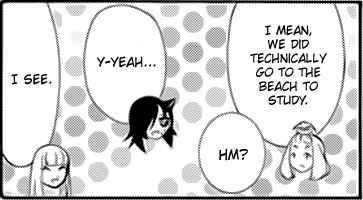
Okada with the save. Sure, she probably didn’t want to look like a slacker from Katou either, but still. If Katou’s the mom friend, then Pineapple-chan’s the exasperated, but supportive onee-san friend.

I just realized that this is a standard routine with these two: Yuri will say something tactless and Mako will call her name out in admonishment. If this has been going on since they first met, then Mako has boundless patience and/or is the absolute best friend that no person should ever take for granted. Not that
Yuri does...mostly.
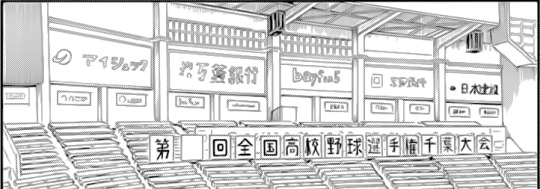
Y'all can tell that baseball fan Ikko had a blast drawing the backgrounds in this chapter.
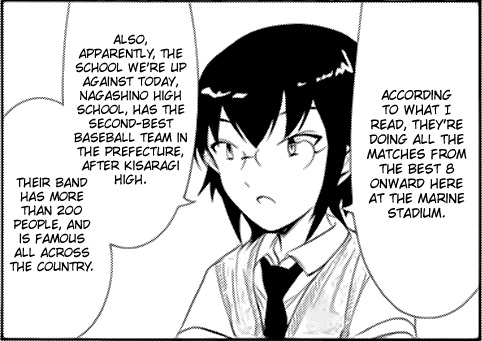
Speaking of which, I’m 212% certain that Komiyama’s role in this chapter is to be the mouthpiece for Nico Tanigawa’s baseball fanatism. Given that it’s technically in-character (for who is basically their self-insert), and baseball chapters can only feasibly happen every hundred chapters or so, I’m fine with the mangakas taking these little indulgences.

Hey, let the girl live a little! Komi’s gotta cram ten chapters worth of dialogue she won’t get into one.

Pardon me, Tomoko, but you seem to have left your self-awareness by the entrance to the stadium.

Naturally, Tomoko hates that Komiyama isn’t making a fool of herself in front of her mom-crush. It’s easy to forget that so long as you don’t set off her berserk buttons, Komiyama is actually quite...normal. Like, being amicable with others and casually humble-bragging is her default state.
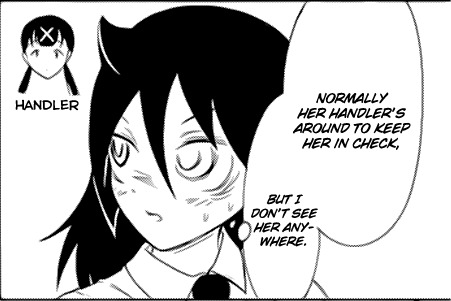
Nico Tanigawa’s artistic habit of putting nicknames under faces always amuses me.

There’s being upset, and then there’s being petty. We all know that Tomoko is aware that Itou is in the band, and any other day, she wouldn’t hold that against the girl. But because she’s salty over Komiyama acting cool, her sensibilities revert back to Year-1 Tomoko logic.
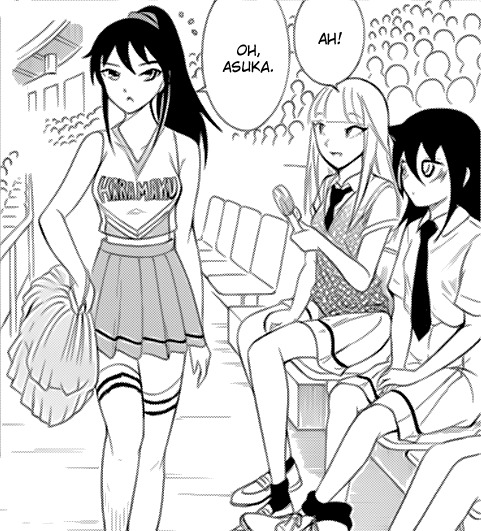


Now, if I were a more crass person, I could make the assumption that the majority of those underclassmen were a combination of girls admiring Fuuka’s “cool beauty” status and boys wanting to check out an attractive senior girl in a cheerleading outfit, discrepancies notwithstanding.
But I won’t.
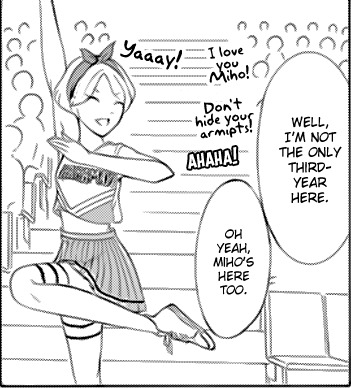
Oh yeah, Miho. Based on the above cheers, she seems like your average popular girl, but if you recall, she got a kick out of Katou’s “offers” to Tomoko. That said, I wouldn’t be surprised if she had a bit of a mean streak in her.
Btw...armpits? Okay, then...

You’d think that by now, Tomoko would learn some subtlety before pulling shit like this.

Normally, I’d call Tomoko out for shenanigans since I thought she was mostly over the whole “slut-shaming” thing. But given how she wasn’t thinking this when the girls in her class wore cheerleading outfits during last year’s sports festival (that we know of), I can only assume that this is more of Tomoko’s jealousy due to Fuuka’s friendship with Katou.
Either that, or Tomoko just doesn’t want to admit she finds her hot.
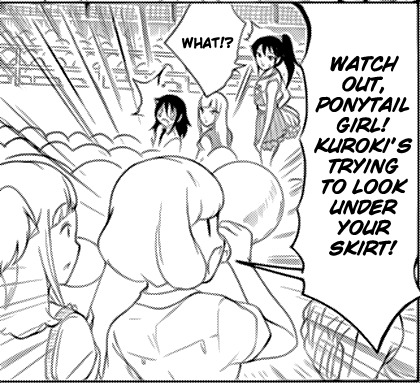
I think we’re all in agreement that Ucchi’s gonna lose massive points for this.
On the other hand, the image of Emoji Girl screaming about Tomoko’s crimes through a megaphone is peak absurdity, and I’ve been laughing my ass off for twelve minutes.
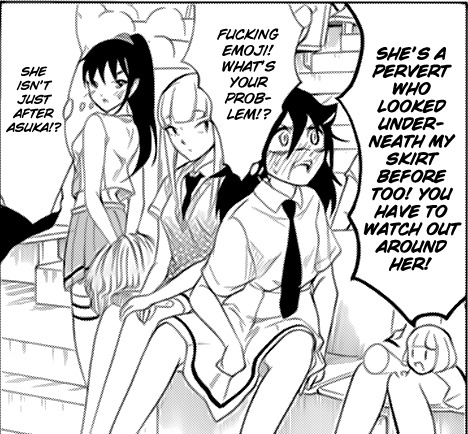
In all seriousness, I’m kind of glad that Tomoko is finally getting her way overdue karma for all her skirt-peeping. Sure, it’s all been played for comedy, but that doesn’t change the fact that its sexual harassment, or the fact that she’s more than likely gotten away with it for being female.
It’s all fun and games until your stalker calls you out on it.

LIES.
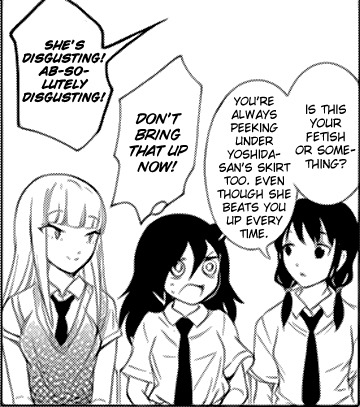
You know...maybe it is Tomoko’s fetish. She’s done it so frequently, and it’s always been portrayed as just another one of Tomoko’s “quirks”. But given the context of all those occurrences, having a skirt-peeping fetish actually sounds very plausible. Thank you, Yuri, for that insight.
Looking at Katou’s expression, it might be her fetish, too...

Seeing Tomoko get more and more mortified as everyone keeps dogpiling on her shame makes for quite the cathartic reading.
Add on to the fact that Komiyama, the biggest perv of all, is the most dignified at this moment just makes this whole chapter an absolute treat.

Considering that Tomoko basically just got outed as a pervert in the middle of a crowd of spectators, she’s taking this quite well. First-year Tomoko could’ve had a legit panic attack if that had happened, but now, she actually has enough nerve to retaliate. Sure, Tomoko had some decent ammo with the Tanabata wish, so she likely had more guts than she would’ve been, but it’s still impressive nonetheless.

Sasaki Fuuka–putting a new spin on the term “victim-blaming”.

Komiyama can be the reasonable one while Tomoko is the crazy pervert, or Tomoko can be the reasonable one while Komiyama is the crazy pervert.
But the universe just can’t have both be reasonable or perverted at the same time.
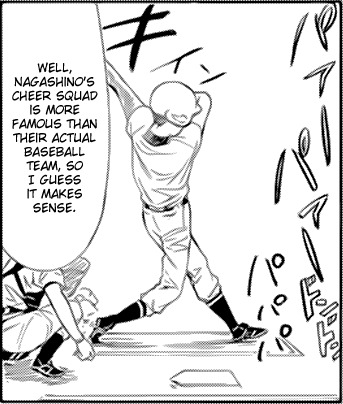
As someone who knows jacksh*t about sports, I have to admit that this is an interesting fun fact if it can be applied to the popularity of real-life sports teams and cheer squads.

I could totally see this becoming a meme in the Watamote fandom. Anyone?
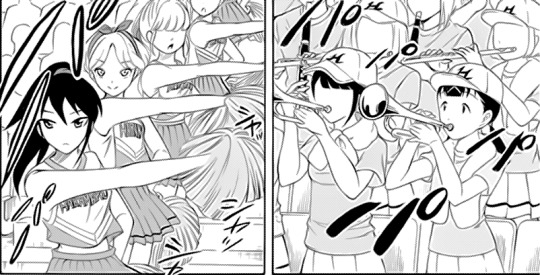
These moments of zero dialogue, sometimes a whole page’s worth, excel at immersing the reader into the story. Suddenly, you’re not just reading about characters in a story. You’re now experiencing first hand what’s like to be at a baseball game, with a few familiar faces from the band and cheer teams making it feel a lot more lively.

If it weren’t for all the wonderful peeps on Reddit, I never would’ve caught that this is the same baseball manager we’re seen periodically since the beginning of the series. You know, the one Tomoko did that fake dub for?
Perhaps I’ll call her...Beta!Nemo.

A PSA to all you non-sports fans: You can now pretend to be interested in your favorite high-school teams just by tuning into your local service provider.
Go, Harajuku Makuhari!
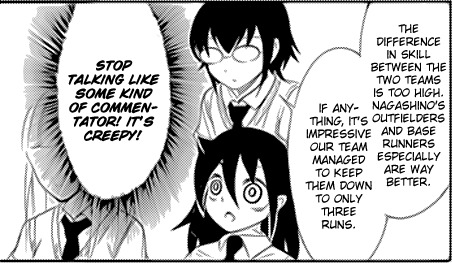
You know, I think I mentioned before that I wasn’t sure what Komiyama’s career prospects were.
Now I’ve got a clue.

Yo, I could feel that pain from my screen.

For a second, I thought this was Reina, given we can’t see her eyes and that she’s manspreading (sounds like something she would do). But then I pictured her actually signing up for cheerleading and...yeah, no.

Not to sound all pretentious if you already know, but cheerleading really is one of the most difficult, dangerous, and underappreciated sports there is. In addition to all the physical risks, you have to maintain an endlessly cheery disposition, even when it’s hard. That’s why I call it the “customer service job” of the sports industry.

The go-to method to keep your in-story sports team at peak realism:
Unwavering mediocrity.
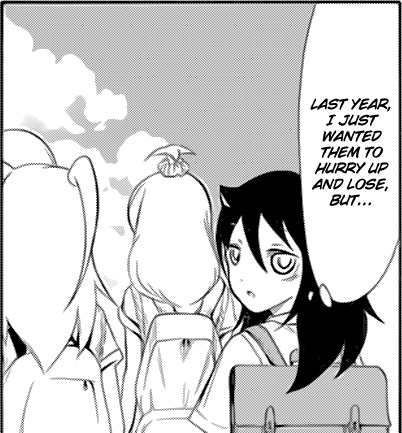
As opposed to them hurrying up and win? Quite the pessimist you are, Tomoko...
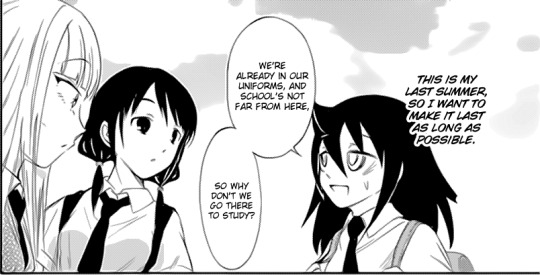
not.
As startling as it is to hear these words come out of Tomoko’s mouth, it’s not entirely unfounded. For all her negative worldviews, crude behavior, and general apathy, the one thing that has always been constant about Tomoko is that she knows things can be better and she wants things to be better. She never got the chance to really strive for it back then when she had nothing to latch onto. But now that she’s got friends, Tomoko realizes that she can feasibly make some of those ideals a reality.

Their unbridled admiration is sweeter than diabetes.
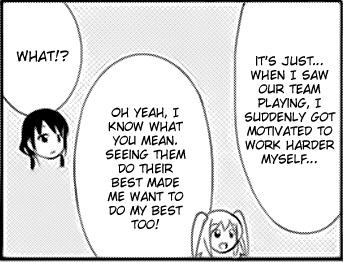
Insert long-winded discussion of a related social phenomenon that probably exists, but the author is too lazy to research here.
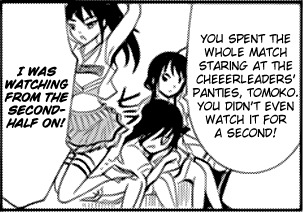
She...didn’t deny it.
Character development...I guess?

I was wondering where Tomoko would draw the line on her slut-shaming towards Fuuka. Granted, it’s probably easier to feel empathy when you can see that shit happening from other people rather than yourself.
But seriously, Katou? Pimping out your friend? You terrify me more and more with each passing chapter.

See what I’ve been getting at? Tomoko knows that realistically speaking, her summer is probably not going to be anything extraordinary. Inconveniences will occur, moments of boredom will arise, and missed opportunities will transpire. But as I’ve reiterated time and again, even those “plain” experiences can become delightful memories when shared with those you care about.
That’s going to be a crucial feeling from this point on, it looks like. ‘Cause based on Yuri’s expression, she may have the most difficulty resonating with that kind of emotion. Let's see just how Yuri handles an expanding social circle–Tomoko included–that’s a little more bright-eyed than she is.
We’re in the seventh inning stretch of Tomoko’s third year, and time will only tell if it ends in a victory.
#watamote#watamote review#chapter 166#no matter how i look at it it's you guys' fault i'm not popular!#tomoko kuroki#asuka katou#akane okada#yuri tamura#mako tanaka#kotomi komiyama#hikari itou#hina nemoto#sakaki fuuka#emiri uchi#review
42 notes
·
View notes
Text
An Angel, and Lucifer’s Kid? Queer-Coding and Dean’s “Found Family” in 14x13 Lebanon
It’s time for some unashamed, LGBTQ subtext-reading Supernatural meta to celebrate Valentine’s Day!

“What, you think you have some kind of special buzz-bedar or whatever?”
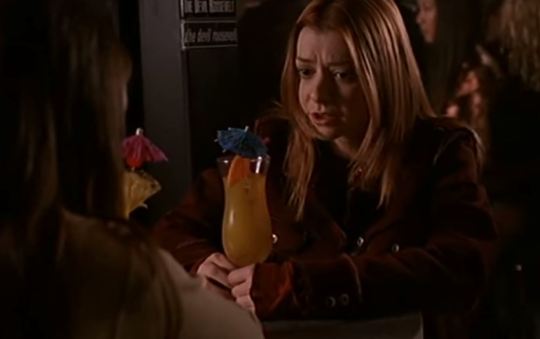
(Willow and Kennedy at The Bronze in The Killer in Me, 7x13)
Well.... yeah...
Because this conversation... in which John said he wished for “a normal life” for Dean...
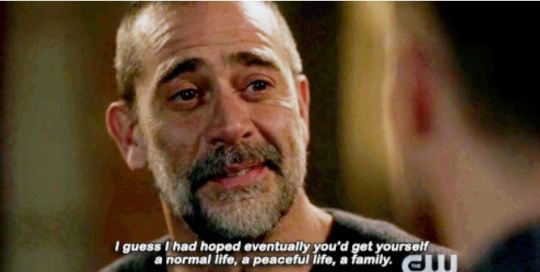

See the original gifset here:
https://hellgracer.tumblr.com/post/182652253539/thats-right-you-do
This conversation? Pings, hard, for LGBTQ folk....
Here is Ellen’s character on her ground-breaking sitcom, coming out to her parents in 1994 ... (Ellen 4x4 Hello Mudder, Hello Fadder):
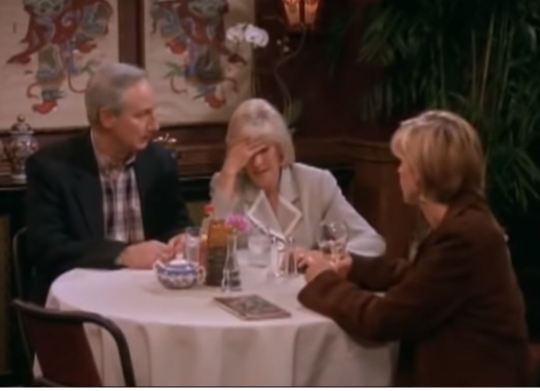
ELLEN: “Please understand, that for the first time, I am really, really, happy.”
ELLEN’S DAD: “Oh, so now you’re saying you had a lousy childhood? Your brother Stevie had exactly the same childhood and he turned out perfectly normal” [my italics].
There’s that word.... normal.
Do you remember the title of Larry Kramer’s 1985 play about the HIV/ AIDS crisis in New York (later a 2014 TV drama starring Mark Ruffallo and Matt Bomer)?
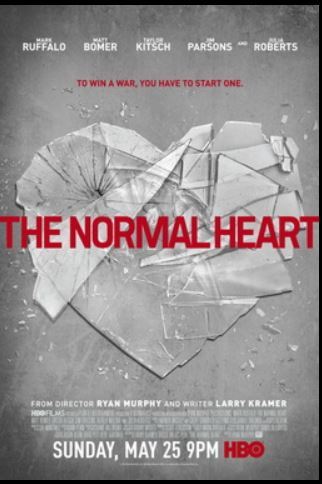
The American Psychiatric Association’s Diagnostic and Statistical Manual removed homosexuality from its list of “mental disorders” in 1974 (after concerted activist efforts). Before that, homosexuality was officially classified as a psychological “abnormality”.
Here’s more on the history of that classification and its removal:
https://www.ncbi.nlm.nih.gov/pmc/articles/PMC4695779/
So that word “normal” (that refrain, “Why can’t you be normal? I want a normal life for you, a normal family...”) resonates in LGBTQ history.
And when Dean has the above one-on-one conversation with his father, the ghost of John Winchester, pulled-out-of-time, there’s a resonance there (should you choose to accept it).
Notice it’s Dean who has this particular conversation with John, not Sam.
And of course, John is thinking about a heterosexual family, marriage to a woman and kids, like the family he had with Mary, way back when. That’s the default assumption for a guy like John, right?
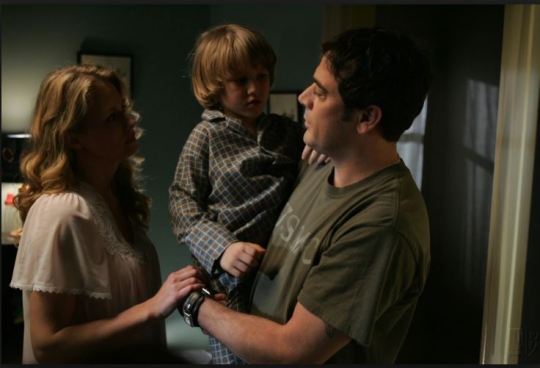
So when Dean answers, “I have a family,” the narrative (given John means a wife and kids - he already knows Dean has his brother) substitutes Castiel and Jack into those negative spaces.
Here they are, Dean’s brother, Dean’s angel and their adopted kid, taking care of said kid at the hospital (as families do) (14x07 Unhuman Nature)

“Found families” which don’t look nuclear and hetero-normative (a significant element of the awkward hospital check-in scene in Unhuman Nature) have been, and continue to be, a significant feature of LGBTQ life, because despite advances in rights and societal acceptance (in the US, where SPN is set) many continue to be rejected by their birth families:
https://www.vice.com/en_us/article/ywbkp7/why-queer-people-need-chosen-families
https://www.bfi.org.uk/news-opinion/news-bfi/features/families-gay-lesbian-transgender-queer
I’ve argued previously that the Ma’lak box (now officially dubbed, by some wags in this corner of the fandom, the Drama Coffin TM) stands as a metaphor for Dean’s self-repression, and, in a queer subtext reading - for the closet:
http://drsilverfish.tumblr.com/post/182375754379/a-fridge-locker-an-enochian-puzzle-box-a-malak
I mean, Dean literally builds a box to lock himself inside, in a room full of sexy male pin-ups...
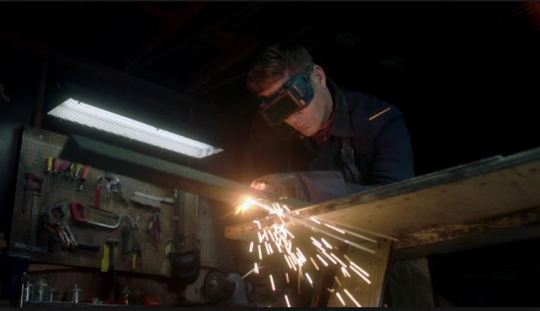
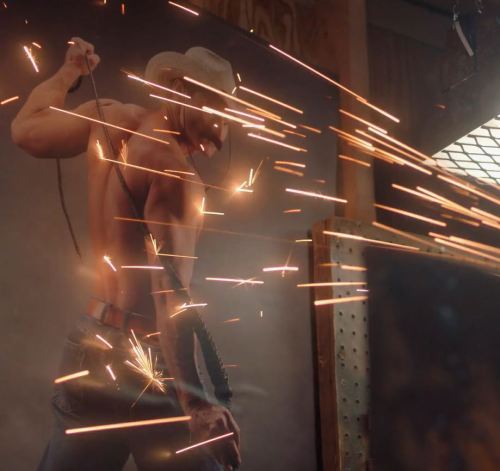
You have to work hard not to see that...
I’ve also argued previously that AU!Michael has been set up as a dark mirror for Dean’s self-repression/ the ghost of John Winchester (who is the source of Dean’s self-repression):
http://drsilverfish.tumblr.com/post/179226151009/queer-gods-and-monsters-14x02
http://drsilverfish.tumblr.com/post/182120562849/aumichael-and-the-closet
Now, let’s take a very close look at the moment John arrives at the Bunker in 14x13 Lebanon, with help from the Superwiki transcript:
http://www.supernaturalwiki.com/14.13_Lebanon_(transcript)
DEAN: “So, what do I…”
SAM: “I don’t know. I-I guess you – you hold the pearl and – and concentrate on what your heart desires.”
DEAN: “Michael outta my head. Got it.”
And then the lights go to red emergency and the looming ghost of John Winchester appears, punching both his boys to the floor and pointing a gun at them....
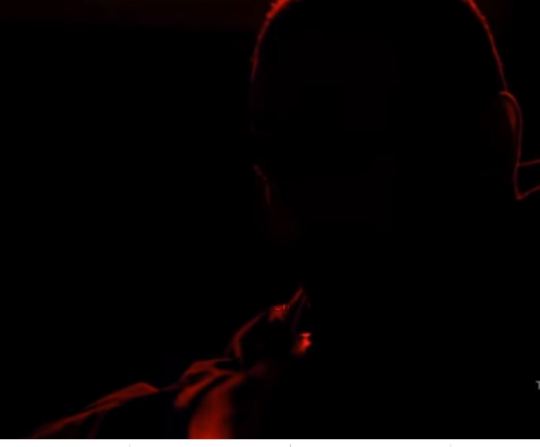
Do you see it? Do you see the transition?
Michael out of Dean’s friggin’ head IS (metaphorically) the ghost of John Winchester (who arrives to red warning lights, with violence and control) aka Dean’s self-repression.
So when Dean is able to tell his father, who raised him to be a “good little soldier”, to shoulder parental responsibility for Sammy, to perform a certain kind of masculinity (muscle cars, classic rock, no chick-flick moments) aka to tell his own internal voice of self-repression, proudly that he has a(n unconventional) family - consisting of his brother (whom he “practically raised”) his angel, and their adopted Nephilim son - well, we can argue that frames Dean (subtextually) as taking a step towards owning his queerness. Particularly as he later tells his brother, “I’m good with who I am.”
Here, have Cas holding a heart while Dean looks on in 5x14 My Bloody Valentine .
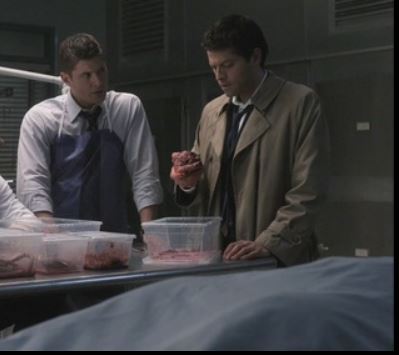
Do you remember Metatron’s angel-fall spell, back in S8?
1) Heart of a Nephilim (product of angel/ human sexual/ romantic congress)
2) Bow of a Cupid
3) Grace of an angel
http://drsilverfish.tumblr.com/post/50579065447/metatrons-spell-the-ingredients-spn-8x23-the
Specifically, bow of a Cupid who had just helped two dudes fall in love whilst Cas and Dean looked on (narrative mirroring) in 8x23 Sacrifice:
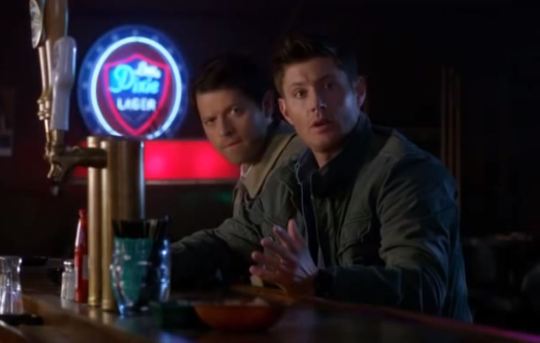
Specifically, Castiel’s own grace. And, yes, I’ve written a meta about how grace is figured as spunk sometimes in SPN here:
http://drsilverfish.tumblr.com/post/173619016494/spunk-of-an-archangel-13x21 )
If you think about those “angel fall” spell ingredients, they’ve (metaphorically) come to fruition in S14.
Dean’s found family contains: the heart of a Nephilim, in the form of his adopted son, Jack; the grace of Castiel, now living with them (finally) at the Bunker, following Cas’ own long journey after the angel fall. And Jack himself, who, as the offspring of a human/ angel pairing is a huge metaphor for human/ angel love (aka Cupid’s bow).
And when Dean destroys the pearl, which summoned AU!Michael (metaphorically) out of his head, in the form of the ghost of his father (aka his self-repression) - what happens when that has been faced and laid to rest? The time-line course corrects, and instead of the mind-wiped solider of Heaven, who didn’t know him, Dean gets “his” Castiel back, the one who loves him, his actual heart’s desire.
And... cue intense staring, Romeo and Juliette style, in a closing balcony scene:


Happy Valentine’s Day 2019 Dean and Cas!
NB: Usual disclaimer - this narrative concerning Dean’s queerness can, and most likely will, continue to be told entirely in subtext, as it has been for 14 seasons now, and for 10 specifically in relation to Castiel - ever since Dean stabbed Cas through the heart at their first meeting in 4x01.
You can read more about what I think about the ethics of continuing to tell this story in subtext under my “Reading Subtext” tag.
#Supernatural#14x13#Lebanon#SPN meta#Meta#Dean is bisexual#Destiel#Still subtext#But subtext IS part of narrative
387 notes
·
View notes
Text
i’ve been thinking about it a lot this past week, about how defining myself objectively doesn’t seem to be working out. this is a broad topic, as broad as my comments on the subject of “self”, on my personas, on the reality... i guess it’s a funny way of saying how little control over my perception i have. we have, people have, but i’m writing this about my experiences
last week a girl from BA sculpture approached me: we met before, talked but not too much, hadn’t seen each other in a while. she had an urgent question, wanted to know how my thesis worked out, what did i get? i told her then that i got an A, to which she replied she never doubted it.
while i remember i put a lot of effort in it, i always do with things that are important to me, sometimes too much it feels, i don’t... here’s the issue i’m getting at: i can’t achieve certainty.
i appreciate what i do, i pride myself over my work, the layers and the details — that’s the first stance.
then there is something one of my teachers once defined as an “A-kid syndrome” — the urgency to be the best. and that’s a loaded one because at the same time you’re forcing yourself to look down, god forbid the rest notice your success and make you into The Other. school experience! (won’t get into all that but due to how little i remember already, i feel sometimes that i wasn’t directly bullied, wasn’t directly an outcast... wasn’t directly an A kid too, these people saw my effort and took 4 points out of my research project because “he title wasn’t exactly accurate” even while they kept insisting that you CAN’T change it. and so they took the points and i didn’t get the silver medal and all i got was a question of why exactly had i wasted three years on all of these grades. no recognition, no validation. school told me that you should never put rules above yourself, it never pays off and you will be broken while the rules and the upholders of these rules won’t even blink)
so! there’s the “i’m good and i love myself”, the “i have to be the best always” and the “don’t make me the best or the others will harm me”. on top of it all and the real curiosity here is the... well, i can’t tell if that’s a separate opinion or an outcome of the previous ones, but i can’t seem to...
that girl told me that she loved my performance, my speech, which i accepted, although i— we’ll get there. so that was fine! but then she said that she recorded my speech and relistened to it and it impressed and inspired her so much, she wants to make her thesis on a close topic. how personal it all was, the things i said
i evaluated her words then: i knew before and know now that i’m a really good speech giver. i’m good with languages, i have practice in both voice work and in making a connection with the audience (everyone on tumblr somewhat claims they are the funny one in their friend group, interestingly. i crack jokes (dubious degree of funny!), the purpose of it all is to make others listen, make them want to listen and... i wish i didn’t believe in this so desperately for so long, in proving my own worth to everyone, but at least i got this skill now. can tell fairytales :- )).
and if you want something reliably objective: i’ve been told i’m good.
however! under it all there’s more ideas: i must be praised, but attention like that and comparison to others makes me extremely uncomfortable, so in getting validation i only have to rely on myself. mind you, when i get negative feedback, i remember it. it’s only an issue when it’s good.
it works like that: i get a comment, i’m surprised, then i’m seemingly not surprised because “obviously, i Am the best. we know!”, then comes the question of others (because i have to shift the focus, why are we all about me? haha) and at the same time, i have to keep my face. no, i will not lower myself in front of anyone, i will show everyone my confidence, i will do it for myself first and foremost but with consideration for others. but then after the comment has passed, EVERYTHING goes into forgetting it ever came.
because it’s just too much! with all these conflicted feelings i can’t just feel good about it, i feel bad, very bad and VERY guilty! so i forget and forcefully doubt and it happens without my notice sometimes. it’s my default assumption that people don’t remember me, don’t care for me or for what i do. even when i get told otherwise, because i accept but don’t implement it, i can’t!
with this incident — which was definitely a pleasure, i mean it’s honouring — i was trying to rationalize my reaction, but words are only words, while feelings are a web so vast, never meant to fit into this boldly restricting system. so i got crude theories that don’t even cover it all. and yet again i think how these patterns seem to repeat themselves: i feel guilt when i look at myself in the mirror and recognize that i look good, i can’t get rid of the need to punish, there’s so much!
but that is life and i take it for what it is. i love myself more than anything, hope you love yourselves too
15 notes
·
View notes
Note
i swear this isnt malicious, im curious. if its not okay to have a sentient species be 'evil' or 'good,' (and yeah, both are lazy at best), why is it okay for /creatures/ in DnD to be 'evil' or 'good'? why is it okay for less humanoid sentients, like dragons, to be 'chromatic is evil' and 'metallic is good'? and if we recognize traits even within species in real animals (like labradors being really mellow dogs compared to huskies being high strung) why is it awful for sentients to be different?
[Heads up to critters avoiding C1 spoilers that there is some discussion of the Chroma Conclave arc in this post. It’s not super detailed, and doesn’t spoil specific plot points; it’s mostly general analysis of the framing plot of that arc.]
I’m not sure that I do think it’s okay for sapient creatures to be “evil” or “good.” Or at the very least, I’m not sure it makes sense for sapient creatures to have ingrained moral alignments. At the same time, even just bringing it down to semantics, it’s different to have an evil “race,” versus an evil “creature.” It’s a distinction that gets wibbly, because of course Orcs are just as fictional as dragons. But where Orcs were derived from existing racial stereotypes, dragons are derived from folklore and fairy tales. Part of the point I was making in my previous post is that the moment the word “race” got involved in the project of essentializing traits in fantasy species, the concept became inextricably linked to our real world understanding of race.
“Monsters” and “creatures” are often used as allegories in the stories they appear in–this is how the Chroma Conclave works in campaign 1. Sure, Vorugal, Umbrasyl, Raishan, and Thordak all have character and personality traits. But Matt’s construction has them representing traditional “vices” (wrath, pride, greed, vanity, etc.). It doesn’t make any particular sense why a red dragon is vain, or a green dragon is deceitful, but those details are drawing from a narrative tradition of using symbolism to represent specific themes and attributes. I don’t think that having inherently evil dragons contributes to the problem of implying race has a determining factor in morality in the same way having inherently evil Orcs, Goblins, or Drow does. At the same time, I think that it’s a weak narrative tool if you’re planning on having dragons populate your world as actual characters (and not just allegorical figures).
The fact that J’Mon Sa Ord is a fully developed character with motives, beliefs, and goals, where most of the Chroma Conclave exist as caricatures* doesn’t make a whole lot of logical sense. What allows metallic dragons to be paragons of virtue and to operate within humanoid cultures, where chromatic dragons are seemingly only interested in acquiring wealth and power? What prevents J’Mon Sa Ord from being a black dragon versus a brass dragon? There may not be anything “wrong” with chromatic dragons being inherently “evil,” but what purpose is it serving? I get that when it comes to role-playing games and world-building that it’s sometimes easier to paint with a broad brush: if your hero can identify an evil dragon on sight, it makes saving the world a lot easier. That doesn’t mean those decisions don’t have broader implications.
I think this question hits at two separate–if intertwined–conversations about some of D&D’s fundamental building blocks. You’ve got the conversation about representations of “race” in the game, and the moral alignment system that makes up a large mechanical component of the game. I have a objections to D&D’s morality system that are entirely separate from my issues with how D&D canon handles race. Morality (much like racial traits) gets simplified into something that can be quantified or fixed, ignoring the ways morality actually operates in the world. I understand the way mechanizing this concept provides a foundation for entry into a complex gaming system. I even think there are creative ways to use and explore the alignment system–sometimes the constraints of a rigid system allows you to explore what happens when you push up against those very boundaries. But the alignment system often logically falls apart the longer you look at it.
As far as personality traits in other species goes: first off, I don’t think dog breeds exist as a helpful point of comparison for this conversation. I am not an animal behaviorist, nor a biologist, so I’m not going to go into the concept different dog breeds having different observed temperaments. I am also not a philosopher, so I’m not really equipped for a larger conversation about sentience vs. sapience. But, the important thing about sapience over sentience, is that sapient beings generally understand the concept of there being “right” and “wrong” actions, and make decisions accordingly. There’s a reason why beasts in D&D are unaligned: non-sapient creatures act primarily on instinct, without regard for morality.
I will also point to something I said toward the end of my earlier post–“seemingly inherent racial/species differences can be rooted in things that are legitimately value-neutral qualities of your fantasy race.” I don’t think that it’s “awful” to suggest there might be inherent differences across species. You could, for example, have one race in your world have, on average, higher levels of serotonin. That’s not going to markedly affect their actions and morals, beyond them generally having a happier disposition and better executive functioning skills, perhaps.
The idea that different races are inherently more aggressive, or virile, or “lazy,” are all based in racist and eugenicist logic. That’s without even getting into the way specific fantasy races have drawn on specific racial stereotypes. The very idea that there is some biological imperative involved in morality or behavior is specious. And, look, I get that not every sci-fi/fantasy writer has studied race, gender, and sociology. I get that these things are ingrained into our understanding of the genre. It’s easy to fall back on those narrative and world-building shortcuts when creating a story or setting. I’m not trying to make a value judgment or moral accusation against the writers at Wizards of the Coast. However, I think it’s important to point out the places where creatives are (often unintentionally) reifying negative social dynamics.
At the heart of it, I think the idea of inherent morality is limiting. It limits the stories you can tell, the types of characters and cultures that exist, and it limits an audience’s understanding of what their own world looks like. Fantasy isn’t exempt from acting as a mirror to the “real” world. Its representational work may happen on the level of metaphor and allegory more often than realistic fiction does, but it’s ultimately still exploring themes that connect to the world the audience lives in. By questioning the default assumptions we’ve come to take for granted in the genre, we open up new, and more complex stories to explore and share.
*Two things on my Chroma Conclave comments: 1) I think Raishan exists outside my framing of the Conclave as caricatures–on an allegorical level her “vice,” pretty much requires she have more dialogue. We also see Raishan interact with VM more than any of the other conclave members. At the same time, Raishan plays into a whole other narrative trope which links disease to corruption and failed morals. That’s not a conversation I really want to have right now, but I think it’s generally important to keep in mind that a lot of tropes that exist in fiction are drawn from stereotypes and prejudices aimed at various disenfranchised populations. 2) Absolute none of this was meant as a dig on Matt. I enjoyed the Chroma Conclave arc, and found the allegorical aspects of it to be intriguing.
#Anonymous#asks#critical role#cr1#fantasy race discourse#dnd#i tried to mostly avoid using academic jargon but i know it slipped in a couple of places#sorry!
92 notes
·
View notes
Text
How To Heal From A Toxic Childhood?
Well first, let’s be sure that you had a toxic parent. Here are 10 signs that you grew up with toxic parents who had an impact on your emotional well-being, according to Healthy Way:
Signs You Were Raised by Toxic Parents
1. Their feelings always came before yours. (You had to quickly learn emotional independence.)
2. They didn’t recognize your boundaries. (Parenting becomes toxic parenting when there’s no respect.)
3. They controlled you using guilt. (And the guilt worked.)
4. They demanded your attention. (A healthy relationship is attentive but not overly attentive.)
5. They didn’t talk to you. (This can be considered parental alienation.)
6. They took away their love. (This is also sometimes considered parental alienation.)
7. They were overly critical. (They expected too much out of you.)
8. They competed with you. (They may have been a narcissistic parent.)
9. They made you responsible for their happiness and well-being. (This is not okay from a family member or anyone else.)
10. You’re still scared of them. (Your parent-child relationship wasn’t healthy, and neither is your parent-to-parent relationship these days).
Let Go !!.
These two very little words — five letters in all — are hugely important, because contrary to the popular opinion, which always tells us that it takes the effort to keep trying and hang in, default position for the humans is persistence. What’s hard is quitting and letting go. The reasons are both complicated and simple.
What letting go isn’t
But letting go doesn’t mean pretending that the past never happened, that you weren’t hurt or affected, or that your parent or parents should be somehow let off the hook and not held responsible. It means learning to discriminate between ways of thinking you must let go of and emotions that need to be tossed aside that keep you stuck, and way’s of thinking and the feeling that will help you move you forward and help you heal.
The fancy name for the kind of letting go I’m talking about is goal disengagement. This isn’t a one-step thing, like the image that comes into your mind when you think of the words “let go” — you’re likely to visualize the string falling free from your grasp and the balloon rising in the air, or the moment your hand slips and what you’re holding falls with a thud — but a process, and a complex one at that.
Goal disengagement
It’s basically a four-step process that involves letting go of the thinking patterns that have maintained the status quo (cognitive disengagement), managing the emotions that accompany giving up or quitting (effective disengagement), giving up on that earlier goal (motivational disengagement), and putting plans into action for a new goal (behavioral disengagement).
Each of these steps requires a slightly different skill set:
Cognitive disengagement requires that you stop thinking about why you didn’t achieve the goal you set and worrying and/or ruminating about it, stop running “what if” scenarios in your head that are likely to convince you that maybe you shouldn’t let go after all.
Effective disengagement requires that you deal with all the emotions that are aroused when you fail to achieve what you set out to do; that includes feeling guilty, beaten down, or blaming yourself.
Motivational disengagement requires you to stop thinking about that goal and start planning new objectives, including where you want to go now and what you want to try. Finally,
Behavioral disengagement requires you to act and start planning how you will change your future.
How this applies to a toxic childhood
In case it sounds too abstract, let me put terms into the context of dealing with toxic childhood.
Your childhood was one in which you felt the unloved, unseen, and the marginalized, and were subject to endless criticism and perhaps the scapegoating. You did what you could to armor yourself, or perhaps you placated others instead; in any case, you did what you could to deal until you finally moved out into your young adult life.
It’s at that moment that you began to make your own choices about where to live, friends, how to support yourself, partners, and lovers, but also how to deal with your family of origin. Most unloved the daughters — relishing the fact that they’re out from under mothers’ direct influence — do little to challenge status quo and do what they can to manage situation.

It’s when their efforts to manage begin to fail — they are still hurt by encounters with their parent or parents or perhaps siblings, are unable to manage the resulting emotions, still feel adrift, and are unable to set healthy boundaries — that they realize they’re stuck and have to disengage and find a new way of relating to their family.
Cognitive disengagement is made difficult, because the cultural tropes about family underscore the importance of staying the course and because the unloved daughter is likely to mistrust her own judgment after years of being told she’s less than and likely to be prone to second-guessing (“Maybe she’s right, and I am too sensitive,” “She’s done the best she can, and maybe I’m wrong to ask for more”).
Effective disengagement is hard not just because of the past pain, which arouses all manner of the emotions, from anger to the sorrow, as well as the feelings of the guilt, shame, and disloyalty at even the contemplating managing your connection to your family differently. Then, too, is fear that they’re right about you, and you’re just wrong on every level. Add in fact that the children who don’t get attuned attention they need in the infancy and the childhood have trouble regulating the emotion anyway, and you can see why this part of process of letting go is so hard.
Motivational disengagement is thwarted by what I call the “core conflict” — the tension between your recognition that you need to manage your relationship with your mother and family of origin and your continuing need for your mother’s love and support and your hopefulness that it can be won. The conflict effectively keeps a daughter stuck in the status quo.
And as long as the core conflict continues, acting is impossible, so the stage of behavioral disengagement — of setting new goals for your life and relationship — never happens.
Small steps to letting go
If you find yourself stuck, these strategies may help you break the logjam. Working with a gifted therapist is the best route, of course, but there are things you can do to help yourself.
1. Recognize that it’s not your fault.
Self-blame, which is a default position, keeps you stymied, and thinking that there’s some flaw in you that you could fix and things would be fine does too. Realizing that you’re not to blame brings with it the recognition that you cannot fix this on your own; your parent or parents must cooperate.
2. Don’t normalize abusive behavior.
Children normalize the behavior experienced in their families of origin, and it’s not uncommon for them to continue to do so as adults. Don’t excuse or become inured to verbal abuse; register that it’s happening, and react calmly and in a straightforward way. You have the right to set rules about how you wish to be treated, even with a parent or relative.
3. Set boundaries.
You will need to carve out the mental space to figure out how to manage relationship. Do whatever you need to — cutting down the contact or limiting it — to be able to do so.
4. Build your emotional skill set.
Try to identify your emotions as precisely as you can — an important part of emotional intelligence — and see if you can trace the source of your feelings, especially when you think about your relationship with your mother and other family members. Work on distinguishing guilt from shame, for example, as well as negative feelings about yourself as either deserving of poor treatment or undeserving of love.
5. Manage your thoughts.
Rumination and worry can keep you totally stuck. Research on intrusive thoughts shows that trying to suppress thoughts only results in their being more persistent, so you need to try other techniques. Assign yourself a worry time; another is to permit yourself to confront those intrusive thoughts and think about the worse-case scenario if those worries came true, and you had to deal with them.
Letting go is an art that is hard to learn, but can be mastered.
Conclusion:
The main reason is that most significant individual adaptations to emotional environment happen unconsciously. According to the attachment theory, these are internalized mental models or working the assumptions about how world operates, how people connect or don’t, and basic nature of the relationships.
Evolution has engineered the human infants to survive and part of the survival involves reducing the huge stress; if baby’s emotional needs aren’t being met or are answered unreliably, brain simply adapts rather than feel continued stress of deprivation. This adaptation changes how the child thinks, behaves, and interacts with her primary caretakers, most usually her mother. All of this takes place in first months and years of life, and are carried with unloved child into the adolescence and the adulthood. Science deems these children insecurely attached—not having been able to forge secure and dyadic connection to their primary caretaker. (source) (source) (source)
1 note
·
View note
Text
Wow. Tomoko Kanemaki SUCKS!
I decided to be masochistic and read back through the KH2 novels by Tomoko Kanemaki. And I just have to say: that there are actually people out there who like her writing and consider it to be in as good or superior to the games astounds me. These books are awful.
When they just straight-up adapt the game to text like the KH novels and the COM novels (except for the R/R one, but R/R sucks anyway), it’s fine. They even do the visits to Land of Dragons, Beast’s Castle and Olympus Coliseum better than the KH2 manga does, plus swaps in Agrabah for the far more important Port Royal. But that’s the only good thing I can say about them. In literally every other regard, the game and manga are infinitely superior.
The main problem is simple to sum up: Kanemaki is a fanfic writer. A pretty stereotypical KH fangirl. This in of itself wouldn’t be a problem if she weren’t adapting the games, but she is, and when she combines the game adaptations with her own fanfic based on what she wants to see, there is inevitably going to be a clash between them. The story written by Kazushige Nojima that she is adapting to novel form does not gel at all with what she writes, and as a result she has to either change that story (to the detriment of both it and its characters) or she neglects to change it even when it directly contradicts her own writing. This happens so much that it really makes for an excruciating reading experience. So let me list all of my problems with these novels point by point, to clarify just why Kanemaki’s writing fails so hard.
- I’ll get the biggest one out of the way right off the bat: Kanemaki is obsessed - and I mean obsessed - with the existential plight of the Nobodies, which includes the Draco in Leather Pants treatment to Organization XIII (”Is it really wrong to seek what you’ve lost?” is asked at one point, as though it’s a profound question. Um, when you’re doing so by inflicting that exact same loss upon millions of innocent people, yes it is!) The worst part is that characters (usually Namine, but Axel, Riku, Saix, Xemnas and even Ansem the Wise get on it at some points) are constantly repeating the exact same angsty inner monologues and internal (and sometime external) quasi-philosophical debates about Nobodies. I’m not kidding, it’s usually word-for-word. “Is it right for Nobodies to exist?” “Nobodies have nowhere to go or call home”. “Do Nobodies really lack hearts?” “What defines a heart?” “If Nobodies don’t have hearts, then why do they feel such-and-such?” “Why were Nobodies even born?” “Nobodies aren’t meant to exist, but does that still mean...?” And so on and so on, blah, blah, BLAH. Hearing this over and over and over and OVER again throughout my reading of the novels doesn’t make me more sympathetic of the Nobodies, it actually makes me less sympathetic and want them to go away so I don’t have to keep reading the same damn woe-is-me grade school-level existentialism! I want to keep reading about Sora, Donald and Goofy, damn it!
- Three characters who were mostly on the sidelines in KH2 somehow get a majority of time and focus here: Riku, Axel and Namine. They are even forced into an apocryphal trio together. They are basically treated as the de-facto secondary main characters next to Sora, Donald and Goofy, with their actions and development being given equal importance. Actually, that’s a lie - Riku, Axel and Namine are honestly given more importance. There is so much wrong about this - not only does the trio not feel organic and reek of bad fanfic, but each character in it isn’t well portrayed at all compared to the game or even the manga.
- Riku had the most potential, since he’s always a major character and a more talented writer could’ve come up with more feasible things for him to have been doing off-screen during KH2. But what Kanemaki has him do is ridiculous. If it’s not just stalking Sora, Donald and Goofy as a silent protector (which is the least interesting thing you could do with him), it’s bullshit with Axel and Namine, or fighting Saix midway through even though Kanemaki still keeps Saix’s later line of “Didn’t Roxas take care of you?”, or having him fight Xemnas in the Old Mansion only for Ansem the Wise to show up and Xemnas then just...retreat for no reason, letting Ansem live and thus ensuring the later destruction of his Kingdom Hearts like a dumbass! And through all of this, she frequently makes Riku default back into snarky, arrogant asshole mode, which doesn’t fit his character at this point at all. Also, while I saw no deliberate yaoi bait in the writing of the KH2 game, it’s definitely present in these novels.
- Axel. Oh my God. Anyone who hates what was done with him as Lea in the games, you should blame Kanemaki, since she actually ran with that kind of writing and characterization for him in these novels long before that happened in the games. He is treated as a totally trustworthy good guy who is a great friend to Roxas, Riku and Namine. The one dick move Kanemaki has him make is quickly backtracked on and then swept under the rug. His whole villainous role is whitewashed at every turn, from both what he intended with Roxas (legit deciding to kill him is changed to attempting a murder/suicide so that he can die with his best friend) to everything concerning Kairi (no, he didn’t kidnap her at all, that point is hammered in frequently, he was going to take her to Namine and they’d then see Sora together! And he didn’t want to turn Sora into a Heartless, that was a wrongful assumption on Saix’s part! And Saix summoned those Dusks on Destiny Islands, not Axel! Axel is chivalrous and heroic and does everything possible to protect and save Kairi! Gag me.) It’s so obnoxious, and beyond removing all of the character’s edge, it’s a blatant case of giving a character a major role in a story that they aren’t supposed to have one in just because he’s a favorite of the writer.
- Namine is an equally blatant case of this, but her case might be even worse. Not only is she THE source of the repetitive woe-is-me existential Nobody monologues and debates, with her whole character arc being changed to revolve around this which honestly makes her unintentionally unsympathetic and annoying, but this portrayal of her has a negative effect on her in both fandom and canon. In terms of fandom, a cult of bad apples (usually yaoi fangirls who already hated Kairi) arose around Namine following KH2, declaring her as superior to Kairi in every way and worthy of being the real main heroine of the KH series. Not only is this false, but it arguably got started because of these novels (translations of which had made their way online long before they were localized), where a character who literally only got 10 minutes of screentime in the game literally gets transformed into the main heroine and one of the most frequently appearing characters in general, even if her “character development” is horribly written and amounts to her being a mouthpiece for Kanemaki’s views. Then again, maybe they just projected onto Namine due to her introverted, fond-of-drawing nature, and Kanemaki was just one of them and thus produced something that kept them going. It’s a Chicken/Egg type of thing, I guess. But whatever the case, what it did in canon was worse. Kanemaki was the first to write for Namine after KH2, in 358/2 Days, and her characterization of her translated in game form to the stagnant caricatured plot device that Nomura then realized was easy to write for and convenient for making other convoluted plot turns happen.
- Come to think of it, Kanemaki’s partnering up with Nomura for Days probably did a lot more harm than just with Namine. Because her obsession with the “What Measure is a Non-Human?” trope never truly leaves the series after Days. It doesn’t pop up in BBS, since that was being worked on before Days, but everything afterwards is sure to feature it in some abysmal way or another, whether it be Nobodies, replicas, data copies or beings of pure darkness. The “Nobodies have hearts after all” comes straight from her writing (even if she had it as a needless overcomplication of the original idea that strong hearts can share feelings with those without it and thus serve as a heart for them too, while Nomura’s retcon is just “Nah, the body can regrow a heart, Xemnas lied”.) A lot of KH3′s worst writing might have not existed had Nomura not picked up on Kanemaki’s fixation with woobified “non-beings”.
- Sora honestly feels like an afterthought for Kanemaki. She’s so eager to write new fanficcy material for other characters, but not for the actual main protagonist, who only gets straight-up game adaptation. Oh, except that some of his lines that were “mean” to the Nobodies (and thus “OOC”, as both KH2-hating anon and Kanemaki seem to think) are changed or cut out.
- Y’know how the KH2 manga made Kairi even better than her game portrayal? Yeah, well this novel makes her far worse. First off, her defiant “you’re not acting very friendly!” to Axel is cut because Axel is whitewashed in that moment (he even readies himself to defend Kairi from the Dusks which Saix summons). Later, she does not get away from Axel because he was never kidnapping her to begin with here. She then realizes that he’s really a good person before Saix kidnaps her, with Axel desperately trying to protect her. She then only shows up toward the end when Axel once again comes to be her hero (again thwarted by that dastardly Saix), with her moping about how she can do nothing to help the brave, noble Axel. (I feel sick just typing this...) In the finale, not only does Kanemaki not take advantage of the potential Kairi development that the game relegated to optional text boxes, but she actually destroys Kairi’s entire arc long before BBS did by making one of her few additions to Kairi be an inner monologue she has on the shore of Destiny Islands alongside Mickey, Donald and Goofy just before Sora and Riku make it back, where she’s just wishing with all her heart that they’ll come back because “We’re here waiting for you. We’ll always wait for you.” BULL-FUCKING-SHIT. Kanemaki, just like Nomura and Oka, clearly has no interest in Kairi as a character on her own. She is used here as a plot device for the character development of Axel and Namine, characters she is interested in, even though Kairi had more significance and screentime than them by far in the actual KH2 game. Geez, even Nojima tried with her!
- Roxas is written just fine during the prologue, since his scenes are just lifted from the game. But when he resurfaces in the final novel, added material make Axel be the most important thing on his mind. Even his final thoughts as he makes the full merging with Sora is that he hopes to meet Axel again. More deliberate yaoi-baiting, and more shoving Axel down our throats. Hell, that last novel is even named “Anthem - Meet Again / Axel Last Stand”. God damn it, Kanemaki, Axel was not important to KH2. It’s not his story. Get over it already!
- Hey, remember how in the game DiZ/ Ansem the Wise did a total character 180 due to offscreen reasons when he came back after the prologue? That was dumb. The novels add new scenes for him, so Kanemaki could actually rectify this issue....OR she just repeats it, since the first new scene she gives him also has him in 180 mode due to offscreen reasons!
- Xemnas and Saix both have their levels of menace neutered thanks to the existential angst of the Nobodies affecting them too, with none of their inner monologues bemoaning their fates really adding up with their actions. The game let you make up your own mind as to whether you found them sympathetic despite their monstrous behavior, but Kanemaki is clearly trying to force the sympathy angle, and it really lessens them, especially Xemnas.
- Really, only Xigbar, Xaldin, Demyx, Luxord, and the trio of Hayner, Pence and Olette were written completely accurately out of the KH-original cast. Nothing felt out of place with them.
- Other nonsensical fanficcy events besides what I’ve already mentioned include bringing stuff from COM (like Repliku) back up frequently instead of keeping focus on the story at hand, a totally different version of how Namine and Axel split from Riku following the prologue (one that continues making Namine unintentionally unsympathetic), Riku having Mickey make the promise after the prologue before Kanemaki’s own 358/2 Days retcons this to happening before it, Riku meeting with Maleficent in Hollow Bastion, Mickey meeting with Axel in Hollow Bastion, Axel being the one to wake Goofy up after his “death”, Axel having a sort of odd friendship with Pluto, Ansem the Wise being the one to provide the box of clues for Riku to give, Axel pretending to betray Riku and Namine so that he gets let back into the Organization and thus be able to rescue Kairi, meetings between the Organization where they talk about totally different and less interesting matters than they did in the game, and having Namine stalk the group throughout the finale as she thinks her last pretentious inner monologues. Also, given its subject matter and how it plays during Days’ opening, I swear to God that Kanemaki created the Axel/Roxas ghost scene that Nomura added to KH2:FM. That it shows up in the last novel, word-for-word, a month before KH2:FM’s release, proves this.
- The misplacement of Disney Castle. This one REALLY bothers me. She places Disney Castle between Beast’s Castle and Port Royal in the third novel. This makes no sense whatsoever, since not only was this meant to be Maleficent’s re-introduction to Sora, Donald and Goofy, but now it comes after Maleficent already made an alliance with Sora and his friends at Hollow Bastion! And then all of a sudden, she’s no longer keeping the Nobodies at bay and is back to self-interested villainy! And there isn’t any dialogue explaining this away or anything! We still have Maleficent saying “If it isn't the wretched Keyblade holder and his pitiful lackeys!” as if she hadn’t agreed to temporarily join forces with said wretched Keyblade holder and his pitiful lackeys! Way to ruin one of the best Disney world visits, Kanemaki!
- The whole finale and especially the ending itself, which were so powerful in both the game and even the manga, has no power in the light novel style of writing Kanemaki uses. Part of that isn’t Kanemaki’s fault, since so much of the finale’s greatness is visual and that obviously can’t be recaptured in text form. And yet she still makes some baffling pacing decisions, with stuff like the aforementioned Namine stalking passages throwing the whole thing off, LOL moments such as Riku himself outright admitting that he has no idea where he got Kairi’s Keyblade also breaking the immersion, character alterations like to Xemnas and Kairi ruining the effectiveness of things they do, and a truly WTF-inducing final chapter where the entire Secret Ansem Report is put before a novelization of both the credits scene where Sora sees Kairi’s drawing in the Secret Place and the epilogue scene where they get the King’s letter.
Overall, these novels just don’t feel like Kingdom Hearts II to me. Even the KH2 manga, the middle of its first half notwithstanding, felt like it. This does not. And that’s because whatever the faults in its narrative, KH2′s story was first and foremost a fun Disney/Square crossover adventure starring Sora, Donald and Goofy, with angsty existentialism merely being one of its themes and meant more for players to think about and discuss rather than the characters. The novels tell a story about angsty existentialism starring characters who think about and discuss it, with Sora, Donald and Goofy’s adventures being a passionless afterthought. That there are people who honestly think that Kanemaki doing this “fleshes out the characters” is shameful. Constant angst and grade school-level philosophical circle-jerking is not character depth. It is pretension of depth, hence the word “pretentious” which fits perfectly here. It takes a lot more than talking and expressing feelings at length to constitute character development. It requires meaningful actions, and it requires some form of growth and change. Kanemaki’s characters are largely static, simplistically characterized beings who spin their wheels in terms of both actions and growth. Riku does not change: you can barely tell he has any kind of depression or has experienced any kind of humbling. Axel does not change: he’s a great guy from the start and has no internal problems to overcome, only the external one of being separated from Roxas. Namine does not change, she goes through the same questioning and angsting over her existence and the existence of other Nobodies until the last minute where the answer just suddenly comes to her (in fact, it was apparently in her all along and she just forgot it. Shades of Sora’s dumbass “Power of Waking” arc in KH3 here...) Any actual development that happens with some characters (like Ansem the Wise) comes straight from the game...and Nojima didn’t write that all too well either! There is just very little that’s enjoyable about the KH2 novels to me, and Tomoko Kanemaki’s writing is to blame for that.
In the words of Lemony Snicket: I highly advise you to not read these books.
#Disney#Square Enix#Kingdom Hearts#Kingdom Hearts II#Anti-Tomoko Kanemaki#Bad Writing#Opinion#Analysis#Truthbomb#This has been a PSA
12 notes
·
View notes
Note
Hi, I have a question! What exactly would intersectional feminism look like? I ask because I see a lot of lip service but not a lot of action, and I'd like to know what I can actually do to help out.
good question.
first I want to point you to the roots of intersectional feminism as an idea, theory, and practice: a theory of feminism specifically about the experiences of Black women in the US.
While the theory of being intersectional with your feminism is practicable/applicable in terms of any intersection of negative effects of patriarchy & other types of marginalization, the specific conceptualization of intersectional feminism was developed by Professor Kimberlé Crenshaw in response to observing & experiencing the intersection of anti-black racism and misogyny and how that changed the experience with both. In her words: “The basic term came out of a case where I was looking at black women who were being discriminated against, not just as black people and not just as women, but as black women.” (x) That is: it’s not as simple as experiencing both anti-black racism and misogyny: where they intersect, anti-black racism & misogyny compound, forming a new, specific type of oppression that’s unique from each of its parts. a form of oppression only experienced by/inflicted on black women (and sometimes inflicted on those incorrectly perceived as black women).
so I’d check out what she has to say on it before anything I have to say on it. And on that note:
Here’s Professor Crenshaw giving a TED talk about intersectional feminism
Mapping the Margins: Intersectionality, Identity Politics, and Violence Against Women of Color by Professor Crenshaw
An interview with Professor Crenshaw contextualizing violence against Black communities (women particularly) & defending against that violence
In building her theory of intersections of oppression, Kimberlé Crenshaw coined the term ‘intersectionality’ as a holistic look at how a form of systemic marginalization hurts any one person. and in this way, intersectionality in our feminism is applicable to other intersections of hurt. For example: a burka-wearing person in a wheelchair experiences marginalization in a way that only another burka-wearing person in a wheelchair could, and demanding/advocating better treatment, respect, and recognition for people who wear burkas and people who use wheelchairs at the same time is going to do good for all burka-wearing people who regularly use wheelchairs.
What that ‘looks like’ is going to really depend on the situation, imho, and I think it’s different on a personal vs macro level. my (very rough, very simplified) take on how to practice intersectionality in your feminism is:
on an individual level:
setting aside your assumptions or judgement about a person’s* situation, lifestyle, and experiences - particularly in places where they are ‘less’ accommodated or consideredat a societal scale than you (or also unaccommodated/unconsidered at a societal scale, but in a different way than you are.
listening closely to what a person says about themselves: what they experience, what they already have, and what (if anything) they request from you.
acting in accordance with what that person’s wants & requests rather than in accordance with what you think that person wants or needs.
respecting others as individuals by drawing on experience and education to inform your responses to them, but always remembering that previous information is a guideline, not a rulebook.
This example by @star-anise of how intersectionality would have made the work at a women’s shelter much more effective is, imho, a good example of what intersectional feminism would target if put into practice at an individual level.
on a broad level:
particularly in areas where society treats you as ‘default’**, and therefore ‘normal’, consistently make an effort to be aware of your trained, subconscious assumptions about other people who deviate from the ‘default’.
particularly in situations where society treats you as ‘default’, and therefore you rarely encounter difficulties or discrimination in your daily life, consistently make an effort to be sensitive to how you may not notice inconveniences or outright harm other people experience in the same situations.
make a specific effort to broaden your sources of information by drawing on work from people of many demographics, experiences, and educational backgrounds. listen with particular care to people whose voices are usually ignored or drowned out - frequently people who are marginalized / marginalized in more than one way.
make a specific, ongoing effort to promote and signal boost the voices of people who have traditionally been ignored, pushed to the side, or ‘spoken over’ - frequently people who are marginalized / marginalized in more than one way.
(at the same time: don’t expect any one marginalized person to be a ‘spokesperson’ for all other similarly marginalized people. treat individuals as individuals. recognize that the experiences and opinions of any two people can be wildly different, even if their demographics are the same.)
take appropriate action on behalf of people in the ways you are asked to by those people, as opposed to taking action based on what you think is best for them.
when it’s appropriate***, help teach others. it can be hard to balance this, imho, between not speaking over other people who have disadvantages you don’t and also not demanding that disadvantaged people constantly educate everyone else about their difficulties, but I think it’s important.
recognize that inaction benefits/perpetuates the status quo, which is in favor of the current ‘default’ and hurts anyone who isn’t ‘default’.
on a political level:
where you can, use your privilege (or the intersection of privilege & lack thereof!) to protect others who don’t share your privilege. take action you’re safe to take on behalf of people who wouldn’t be safe to take that same action.
vote for people who pledge to protect & improve life for people in all kinds of disadvantaged situations. Make voting for those people a priority.
attend or support protests on behalf of people who have disadvantages you don’t have.
make donations to advocacy groups made up of the people they represent.
volunteer in fundraising, helping, supporting, etc people who have different disadvantages than you.
I’m sure there’s lots of stuff I didn’t mention that people can think of. but the long and short of it is: respect other people. listen to them. act in their best interest - not your assumption of what would be their best interest.
here’s some more links to stuff I’ve read about this & that might give you more food for thought:
what is intersectional feminism? in USAToday
academic study of intersectional feminism from a student of Denison
video about intersectional feminism on Braless
intersectional feminism vs white feminism in the Chicago Tribune
notes below the cut.
I used a lot of vague language about ‘marginalization other people have that you don’t’ in this post because that goes a lot of ways, and none of those experiences are necessarily comparable as ‘better’ or ‘worse’. they are each unique, though, and each person experiences them uniquely. that’s why the emphasis of intersectional feminism falls on listening to marginalized people, promoting their voices to others, and acting according to what they are saying rather than according to your own wishes or beliefs.
*I used ‘person’ instead of ‘woman’ because there’s a huge variety of people who might be in a situation where they are perceived as a woman or treated as a woman while not being a woman, or treated or perceived as a man while being a woman, and there’s nonbinary people and intersex people and just … a lot being covered here. I feel ‘person’ is insufficient to the meaning but I don’t know what else would be appropriately inclusive and quick.
**in america, some examples of the ‘default’, where deviation (especially in more than one way) creates disadvantages, oppression, and violence: white, male, cissex, perisex, straight & heteronormative, able-bodied, mentally healthy, of average intelligence, neurotypical, monogamous, protestant Christian/agnostic/’rationalist’, English as first/only language, etc.
***’where appropriate’ - imho: this is wherever the marginalized person speaking on their own behalf a) asks you to do it, b) the marginalized person would be endangered (but someone else - you - aren’t), or c) a place where the marginalized person isn’t and/or won’t be respected in speaking for themselves.
for instance: a member of my family voted for Trump. He wouldn’t listen to me about Trump being a rapist & why that’s a reason to distrust him: as a perceived woman, he thought I was speaking based on my own biases. but another cis male member of the family was able to make that family member understand the seriousness and horror I feel about Trump’s treatment of women. (Trump voter has since apologized to me, but it first needed to come from someone he respected already before he could start to respect me.)
and meanwhile, cis white women overwhelmingly voted for Trump - despite all the evidence he never respected women, white or not, and without any regard for - perhaps even because of - his xenophobic and racist platform. (that’s what you get when ‘feminism’ isn’t intersectional.)
#intersectional feminism#unasked for advice#feminism#radical intersectional feminism#which i want to be a thing#racism in america#this is an americentric post#white privilege
241 notes
·
View notes
Text
“Why Can’t I Say This?” Context, Concrit, and Commitment
The current (unwritten) rule for commenting is the golden rule:
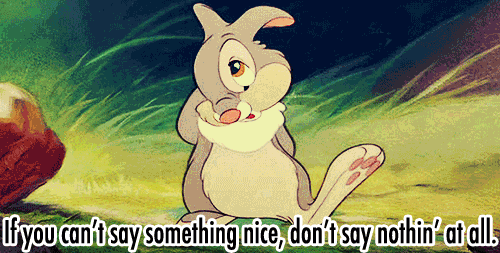
Gif of Thumper from Bambi saying if you can't say something nice, don't say nothin' at all.
Commenting (on AO3) is a public experience and we at LLF have openly supported this stance, urging people to praise in public and criticize in private.
Still, what about those writers who explicitly state at the end of their fic that they are open to concrit? Is that permission to take their fic apart, line by line and give them what is could very easily become the equivalent of a public flogging?
The answer, as with all things that involve more than one person, is that it depends. If you are reviewing a work and find yourself wanting to say more than just praise, here are a few questions to ask yourself that can help you determine if your feedback and criticism is actually constructive.
1. Which party are you at?
First, let’s establish where you’re giving concrit - is it as a beta in a GoogleDoc on a first draft, is it in the public spheres of tumblr/AO3, or are you in a writing group or writing class where today’s assignment is to practice giving critique? Depending on the situation, how much and what type of concrit you give would vary.
Let’s say that instead of fic writing, we’re all chefs (or people who make food) here. We each make a dish and now we want to share it with the world. Do you (A) take it to your friend’s house where they are holding a potluck celebration; (B) set up a stall at the state fair; or (C) enter it into a cooking/baking competition ala Chopped where 5 star judges and food critics will sample your food? Depending on where you take you food, you would expect very different reactions.
Generally speaking, you would probably want your friends at the potluck to thank you for bringing something and compliment you for how delicious your dish is. If you were still fine tuning your recipe, you could let them know and maybe they would be able to say one or two things they liked or didn’t like about it which you would file away for the evening, to be looked at for the next time you made something.
However, if you were at a state fair, even getting your dish looked at by the crowds of people milling around would be an achievement. If someone bought some of your food, that would be fantastic! If they bought it, took a bite, and then told you how tasty it was, even better! Those people that bought your food, went away, and then came back to tell you how much they enjoyed it or came back to buy some more and brought all their friends with them are heaven sent angels. You probably wouldn’t expect anyone to say anything negative about your food because even if you were still fine tuning the recipe, a state fair is neither the time nor place where any sort of meaningful culinary discussion can really take place on a consistent basis.
The situation would be different if you were at a cooking competition. There, you would expect these food experts to pick apart your food. Maybe not steamroll and chew you out à la Gordon Ramsey, unless that’s what you were expecting and the kind of feedback you respond best to (in which case, you should sign up for a competition where he is judging). Perhaps you don’t want to just be yelled at, but would actually like to be coached, then maybe enter a competition with more of a mentoring element versus cutthroat competition.
Being aware of which and what kind of party you’re at helps establish expectations and prevents you from breaking the dress code and expected rules of conduct - something that often leaves you and the host standing around in embarrassment at best and on toxic hostile terms at worst.
We’ve all heard stories about people leaving concrit on works and might have started out as a gesture of good intentions, devolves into a dumpster fire of abuse and personal attacks. If we give each party the benefit of the doubt, this kind of scenario often stems from a mismatch of expectations.
In my opinion, posting to ao3 is closest to the state fair, and is why the “positive feedback only” default is perfectly acceptable and even encouraged. If this stance annoys you, this might be an indication that there is some disconnect between what you really want as a commenter/author and where you’re going in order to get it. I think that we can all agree that going to the state fair and expecting Gordon Ramsey to show up and tell you why your dish sucks is just… not going to happen. Even more, it’s something that shouldn’t happen on the reg. What if you were at the state fair to raise money for charity? No well-meaning person there is going to tell you that your food sucks and that you should do better - and if they do, they don’t mean you well.
So how do determine which party you’re at and what sort of criticism, if any, to expect? Well, when in doubt, ask.
2. Who are you and who is your audience?
When it comes to feedback, take a step back and question your assumptions. Who is the author whose work you are commenting on? Is this an old time friend who you know has nerves of steel and likes every single typo pointed out or is this an unfamiliar username whose work you’ve just stumbled across? Or are you a regular reader who has followed this author’s works, had regular conversations about them with their story, and to whom they’ve expressed their struggles with pacing/plot/characterization?
Are you at Janet’s party, where everyone is expected to pat each other on the back and say something nice to each other, or are you at Bob’s party, where everyone has known everyone for years, has eaten every variation of Dinah’s herring pie, and knows that she’s still looking for the perfect complement to it?
Establishing your audience and writing for them is one of the fundamental rules of effective writing. Whether it’s business emails, academic essays, or love letters, the better you know the person on the other side who will be reading your words, the better you will be able to deliver your message to them.
Be conscious of the fact that people write for different reasons, and that while some may be okay with great advice being shouted at them, it is a nightmare for others. Don’t be a Gordon Ramsey walking around at the charity fair of home baked goods giving tips to the local families trying to raise funds to repair their schools. Be kind and don’t show up at the wrong party.
3. What does the author consider ‘concrit’ and how do I get them to listen to me?
Concrit is, by definition, constructive. It should help an author as well as encourage them to keep improving and to keep writing. If the author comes away feeling discouraged and like giving up on writing, you have failed in your goal of giving concrit.
It doesn’t matter if you have the best cake ever. If you package it in a moldy and dirt encrusted box, I won’t eat it. Likewise, it doesn’t matter if your criticism is pure objective truth (unlikely, since the rules of writing get broken all the time), if you give it in a way that the author is not receptive to, they will not listen.
Giving and receiving criticism is hard, even when you think you’re ready for it. Please also keep in mind that context matters. Anyone who has been a beta will tell you that giving criticism is not easy, especially when we do not have the benefit of verbal and visual cues to help us express what we really mean. How you say things is often just as important as what you say. Tone and nuance is difficult to get right in writing, particularly when two people are essentially strangers on the internet. Cases of misunderstandings and miscommunications abound (they are the villains in so many fics) and sometimes, things just get written the wrong way, or read the wrong way.
Everyone has their own personal biases, and to assume that criticism that you would find helpful and valuable would be similarly received by the author is fallacious and a dangerous assumption. What works for you may be hurtful to others, which is another reason as to why we support the “positive feedback in comments only” default. It’s harder to ruin someone’s day with only positive statements, especially when you don’t have the time or platform to really explain yourself and have a meaningful conversation with the author.
Even in the cases where the author has explicitly asked for concrit, giving it is hard. The best forms of concrit are specific, targeted, and provide a roadmap to the author on why this isn’t working and how to improve. It is not as easy as listing out all the flaws you see and letting the author figure out the rest. If you are serious about giving concrit, make sure that you’re prepared to commit to answering questions and having conversations about why you think something works or does not work. If someone asks you for your opinion on the pie filling, be clear that you think that it has too much salt and only if they ask for it do you tell them about the burnt crust since it could be the case that they are well aware that it is burnt and is why they only asked about the filling in the first place. When critiquing, make sure to establish expectations and who your audience is and commit to having those conversations.
In conclusion...
Consider the fact that feedback doesn’t have to be negative in order to be helpful. If you are able to point out the flaws — and I mean really point them out as writing flaws and not stylistic differences because you are able to pinpoint and explain why something generally does not work — then you should be able to point out the good as well. It is rare when a work has absolutely no redeeming qualities. Maybe you will have to look harder to pick out the unpolished gems, but being able to see the potential and conveying that to the author can more constructive than a hyperfocus on tearing their work apart.
In summary, when you’re tempted to leave constructive criticism:
Remember your audience;
Check your expectations;
Show up at the right party; and
Bear in mind that knowing how to say things is just as important as knowing what to say.
~ mod dragonling
86 notes
·
View notes
Text
”Ladies of the jury, what you might hear today may evoke some form of sympathy, whether it’s for, of course, my client, or the defense. But I ask that you open your eyes to what’s most important in this trial: evidence.”
“The negligence of this driver has caused my client inexcusable and unending pain.”
“I was in the front seat at the red light, it was slightly snowing that day, when all of a sudden... I felt a BOOM! It was so sudden, outta nowhere, that it shook me, and it rattled me. It made me jump from my seat where I was seatbelt, and then I fell back remarkably hard onto the seat.”
“Yes, I took all those vacation trips, but I was in pain. But I tolerated it. Even if something like this has happened, that don’t mean I gotta, have to put my life to a halt, stop my life entirely. I make due with what I can and I try my best, no matter how much pain I am in.”
“A picture is worth a thousand words, and what we can see very clearly from these evidence is no damage to either of the vehicles. On that snowy day, an accident occurred. It was just that, an accident.”
“Sometimes we have to bite the bullet; while yes, it was in part an accident, but was it also in part due to negligence, or just that? An accident to the elements, that it just happened to skid, something out of my client’s control?”
“You have to choose two problems to solve in 10 minutes! Go, and don’t trip!”
“My chair has awakened and won’t stop asking me to sit on it.”
“PUNKS KEEP STEALING MY SHIT WHEN I’M OUT OF MY STORE. I CAN’T LIVE THERE 24/7 TO STOP THEM.”
“It’s like going through a mountain... but with water! Underwater tunnel! Ya dig?”
“Admitting number 1 is like saying, yes I did an underhanded trick to give myself an advantage by putting people in a more pleasant mood so they can judge my invention more positively.”
“I mean, it would have been harmless if it was just regular candy to sweeten up the crowd before his presentation, but weren’t the candies, like, enchanted? And I’m assuming its not printed on the candy wrapper ‘FEEL-GOOD CANDY TO MAKE U FEEL NICE AND WARM AND FUZZY’ or something..."
“Similarly, along those lines, they draw on the emotions of the nearby populace and convert it into psychic energy. They allow for the quori to shape the dreams of mortals around it, basically the same thing as drawing on their fears or negative emotions. i dont want to make it give their targets some mechanical power, but definitely maybe a psuedo placebo affect where they think they’re benefiting somehow when in reality their mind is being warped.”
“Yeah dude, Hannah has so much bird knowledge. I've only gleaned some from talking with her, like how the default assumption for all birds is female if you otherwise can’t tell, because females are bigger than males.”
“Flushing, I’m assuming is like driving wild animals out and have them run so the bird or Darren can catch?” (Darren is the falconer’s German Shepherd)
“Yes! But Darren doesn’t catch, he helps with flushing.”
“Before Darren goes, Hannah would have a long stick she would use to hit thickets. And then Darren just, no fear, runs to chase."
“So, what falconers do starting off from what I heard is that they trap young birds and then do this basically partnership where the falconer will help flush and the bird can catch. And when they're in adult hood, they then get released.”
“Anyways thank you for coming into my bird TedTalk.”
“Is this article her? Haha.”
“Hah, the 'Sport of Kings.’”
“More like the sport of old white dudes, man. Theres so few women in it...”
“Aight we change it.”
“’The Sport of Queens.’”
“HELL YEA”
0 notes
Text
I think the problem is that I love you more than I love myself.
Now normally I am one of those people that are like, “Fuck it! You can love people without loving yourself! That’s how you can grow and heal through connection!” but I do really think it’s a problem in this case. Because the thing is, if it comes down to upsetting you or upsetting me, I will choose to upset me, to hurt me, to belittle, shrink, hide, myself so that you don’t have to get upset. Or so that you won’t be angry. Or disappointed. Or anything negative, really. Because I love you. And I want you to be okay and I don’t want to cause you discomfort any more than necessary. But that’s just the thing. I love you so I’m leaping over tall buildings and walking on egg shells and censoring myself so that I can keep your peace, while entirely upturning my own and letting you disrupt my own peace as well. I’ve been conceding on border lines I didn’t realize I had until all of a sudden my hands were tied. And... And this year has been a lot. It has been traumatic and scaring and scary and rage inducing but you know what? It’s forced me to love myself more. Either by my own resilience in the face of it all or finally getting good therapy which I haven’t had for a while, I am starting to love myself more and more each day. And you know what? I’m learning I want my boundaries back. But me asking for them upsets you. And then I’m back at square one because we’ve talked about it now. I’ve asked, and you answered no.
And do you know something? I don’t know how to respond to that. Because I’ve been learning, and I’ve learned that the only boundary my brain knows how to make is a wall. A cell. Because I’ve discovered, I was never allowed to have my own boundaries growing up so I built walls to protect myself and that’s all I know/knew how to do. But I want to co-exist with you. I love you. And that requires openness and vulnerability. But I also need to do that from my side of the picket line. And I’m learning that’s how I want to love you. Healthily. With respect. Not just for you, but for myself. And I want you to grow as a person and to learn and I can’t help you do that if I keep adjusting my borders for you. I’m slowly understanding that. But it doesn’t help me if trying to wrestle some of my own control back from you makes me feel like the villain still. And I know you don’t mean to. I know that’s not your intention. But if me asking for a little more breathing room makes you defensive and actively triggers you then... Then what am I to think other than I am the one in the wrong here? Maybe that just ties back into the, “I love you more than I love me” thing but just... I just want to be able to talk to you again. I want to be able to air my issues and the ways I’m not okay because I am not okay and not have to worry if the words I’m using in the process of me trying to communicate with you are ones you’ll take issue with. But I think that’s the other issue here.
You love me more than you love yourself.
But in you it presents differently. In you, instead of shrinking yourself to be like an ant on the steps of a monolith, you are always ready for the moment when the other shoe drops. When I become the snake in the grass at the tree of truth. You love me more than you love yourself and therefore you cannot imagine a scenario where my feelings can be genuine. Because in your mind, how could I ever love someone like you? The answer is, easily. You are a wonder. I’ve been saying it for years. And yet even still, even now, you are always so ready to believe that I have done something intentionally to hurt or harm you instead of me just trying to communicate. Is my language clunky sometimes? Sure, and I appreciate you trying to help me communicate with you better. But that doesn’t mean that I’m turning on you. I try to tell you something and the moment I say something wrong it feels like you just shut down and you default to “this is it, they hate me, they can’t stand how I live with myself” and you get defensive because you are protecting yourself from it but I’m not attacking you! You are attacking yourself! And it kills me to think that after all this time, you don’t trust me enough to not want to hurt you. I don’t get any of the benefit of the doubt until the words are already out of your mouth and I feel like the asshole. Even when what I’m trying to say is I feel helpless and exhausted and hurt, I phrase something wrong and all of a sudden you completely lose faith in me. And I’m sure some of the issue is the fact that in my head, I have already given you so much ground and conceded so much that I had just assumed it would be reciprocal. That the trust I’ve placed in you to protect and care for the land I’ve given you is not land that I have been given in your own heart.
Maybe I love you more than you love me.
Which would be fine, I suppose. I know I through a lot of myself at things, at people. I know I have many problems that I am working on fixing. And maybe I let you take up more space in my heart than you have let me take up space in yours. And that’s fine. To each their own. I just... I just want you back. Because I feel like a bridge between us has been burned and I don’t know how to get it back. I don’t know which one of us started the fire or if an external force caused the damage but I miss you. I miss being with you. All of me being with you. Not just me spooning you while I cry because I’m realizing how far in this hole I have dug myself. I miss being seen by you. And I’m sure a large part of that is my own subconscious hiding myself from you but goddammit you don’t make it any easier. You are entitled to your feelings, I get it, and if I hurt them I want you to tell me but all that I feel like has been communicated to me is that my issues? The places where I am struggling in our relationship? The places where I am trying to do the work but failing? Is wrong. Or worse yet, is an insult to you. Like it was absolutely asinine that I would ask such things from you. I know you have your own issues but I want to make us work and I need help with that, I need your help and if you can’t pick up that half of the battle then no SHIT I’m going to suggest you go to therapy. Because I need you to be in that fight with me. I know you have your own war raging inside of you but that doesn’t mean that I don’t need you out here too. And if you can’t handle that then you need help. Because I have tried to fight that war inside of you as well and you keep turning my troops away. So I’ve just been sitting here, watching you fall to pieces knowing that there is nothing I can do to help you put them back together again while also carrying our shared broken pieces and looking to you to get the glue because my hands are full. But you’re too busy with your own war. And you know what? I get it. I do. Life is hard. Living with disabilities and handicaps is hard. But I’m learning that I am not the one who has to be giving in the face of that. I cannot fix you. I cannot help you. I cannot fight the war for you. I’m happy to lend aid and support where I can but I only have so many resources at my own disposal. And I’m learning that I have a history of being told “no” and just accepting it. Even if what I was asking for is essential to my well being. And, I think I’ve let you take advantage of that. But I also think I don’t want to live that way anymore.
And I don’t know what to do. I don’t. Because the last person on this earth I want to fight, is you. I don’t want to have to fight you for things. I don’t want to push buttons that I know you don’t like being pressed because it upsets you. I don’t want to hurt you. But the conversations we need to have are hard. And upsetting. And they need to happen. But there is a small child inside of me who is projecting the outcome of that fight, who knows that history repeats itself and is afraid of where those necessary conversations lead. And I keep letting them silence me. Because I am also afraid. I don’t want to hurt you. I don’t want to lose you in the process of getting what I need. But I do need it. I’m learning that. And I am doing you a disservice by not getting what I need. Because it leads to assumptions and judgements that are wrong and hurt both of us. And I just don’t know how to get there. I can see a beautiful green hill that we both get to stand on with the sun shining and the wind tousling our hair ever so gently. And we are just lying in the grass, content and happy and holding hands. And under our hands is a line in the dirt, a boundary that we know is there but it doesn’t stop us from loving anyway. Because it’s part of our love. Because we love each other too much to cross over it, but we also love ourselves enough to insist that we keep to our sides. Independent together. One, beautiful, loving, gorgeous moment/day/thing/relationship that we both get to experience while also feeling the same love for ourselves. I want that for us. And I know we can get there. I want us to get there.
I’m not giving up. Not on you, not on me, not on us. I am not going to let you go over something that can be fixed. But I need you to see the hill too. And I need you to see that we’re not there. And I need you to pick up some of the pieces too. Please. It’s so heavy. I just want to put some of it down. I’m so tired. Please, just let me give you some pieces.
#text#screams#sighs#I've had a night i guess#maybe its just heightened anxiety about what tomorrow will bring#but whatever it is#it hurts
0 notes
Text
CanvasWatches: Miss Kobayashi’s Dragon Maid
Sarcastic lead? Goofy supporting cast? Loving use of nerdity? Maid uniforms? Fantastical elements stuffed into a slice-of-life narrative? Well, that’s certainly something for me!
Also, it’s alarming how often Quetzalcoatl's been popping up in my work and entertainment. I mean, it’s not an excessive amount, to be honest, but considering my original assumption was ‘Obscure Mythological Figure improperly transplanted into an anime film’, anything more than once is notable.[1]
Perhaps this is punishment for using a mondegreen of the name as my sign off phrase…
Anyways, Miss Kobayashi’s Dragon Maid! It was spoken of highly by an anime reviewer I follow, it was on Funimation, and I need to justify that subscription beyond letting my brother watch Case Closed all the time, so…
Let’s talk about the show.
In a bit of an oddity, I’ve found the Opening and Closing sequences very absorbing. Now, I’m not one to ever skip either in a series, as it’s usually well animated, the music is catchy, and it’s a couple minutes to settle in or grab food or whatever, plus (depending on the player) it can be a chore to skip anyways. There are often neat details hidden away, too, and it’s fun to learn the context of images as you go through the series.
The OP in this case struck me by how it triggered not the ‘Ah, Anime opening song’ switch in my brain, but a ‘Ah, Visual Novel opening song’ switch, which is a weird switch to learn I have, since I haven’t actually played that many Visual Novels. Still, the music itself is upbeat, very energetic, and very “Oh yeah! Let’s get into this! Time to read a bunch, make choices, and seduce a girl!” But I have no agency in the upcoming events, Anime! Why are you trying to make me hyped? It’s working, but I don’t understand the effort.
It’s also paired with the trippiest imagery I’ve seen in awhile, with fractal dragons and people spinning like falling seedlings. Still bright and colorful, and there’s faces to meet over the course of the show, but it’s just utterly bizarre. Maybe because I don’t get exposed to purely comedic animes that often I’m not used to it, but it’s still a ride that I lack the tools to properly contextualize.
Actually, now that I think about it and listen to the song divorced from the imagery, the song reminds me of Rune Factory Frontier’s opening. Huh…
The EP, on the other hand, is a more reasonable montage of Daily Life, with a song that’s also fun. It actually strikes me as more of an OP piece. I really like the song. Considering it’s been a very recent realization for me that Music Albums are intentionally curated objects meant to be listened to straight through to convey meaning, instead of a bunch of singles thrown on a disc, I may not be the guy for musical criticism.
Music is an ineffable magic to me. I lack the tools to create or understand it, but some songs are good?
This had been a tangent. Let’s go to what I’m comfortable with: storytelling!
So let’s take a brief look at something most people take for granted: the episode titles and, in relation, names.[3]
Naming things is a hard task which I have managed to become moderately good at, a fact I derive from the time a classmate in a scriptwriting class asked with mild awe at how I came up with so many names[4] for my 10-minute comedy play. The secret, as with all artistic aspects you find difficult, is figure out a functional system and maintain it.
So I’ve developed a few methods for characters:
Start with a theme (in the case of my play, I was actually going through alphabetically as characters are mentioned) but don’t be afraid to break it if you feel like it.
Stick with one or two syllable names. The longer the name, the harder it’ll be to remember. Same with not going too archaic or foreign with the name. If your audience can’t remember the character’s name or how to pronounce it, they’ll focus more on that than the story.
If you break rule two, it’s on you to have a nickname prepared that follows rule two. If you don’t, I’m going to call you Windy Jerk in my post RPG Session write-ups.[5]
Which is fine for characters, but then there’s titles, which I’m no good at. Titles need to be both intriguing and vague, to draw in an audience, but keep them surprised. This is compounded when you have 13-26 episodes to name. Some shows do a good job at consistently coming up with names, or at least semi-adequate puns, and others just call the episodes ‘[Episode/Chapter/Part]’ and the number in the sequence. Both of these are valid techniques.[6]
Which is why Word Salad Titles stick out so much, and why I love them yet can’t quite master using them myself. They manage being vague not by carefully revealing little information, but overloading with data so fast the audience doesn’t have time to parse it before the shows starts.
Also, they just sound funny.
What’s intriguing about Dragon Maid is that it’s not an extreme example of the Word Salad some comedy animes tend towards (Exclamatory statement! Vague plot summary), but it is a style very similar to myself.[7]
Dragon Maid’s episode titles follow the structure of exclamatory sentences, then gentle snark about the title in parenthesis. While I don’t use exclamations often, the statement followed by snark is something I do with my art work [[Maybe provide examples?]] and is even punctuated the same way, with parentheses implying an aside.
Which is also the speech style of our titular Miss Kobyashi. (Check out my sweet transition!)
Ms. Kobayashi is the first character I’ve deeply related to in a long while. Sarcastic and pretty asocial, she starts the series living alone in an one-bedroom apartment and has a single friend from work. Otherwise, Kobayashi is content with her solitude, engaging in quiet interests. It's not exactly emotionally fulfilling, but it's okay. She doesn't really feel the need for more.
Which is just the opening needed for a Manic Pixie Dream Girl! In the form of a Yandere Dragon Maid Girl.
Manic Pixie Dream Girls have received some negative press,[8] which isn't completely unwarranted, but sells the trope short. After all, when you really get down to it, they're the personification of the inciting incident. A character whose arrival kicks starts the protagonist’s journey of self improvement. Sometimes they need to be dragged kicking and screaming for the first leg, because it's funnier that way. Often times, when using a Dream Girl character, writers take a romantic angle because… that's a popular and relatable motivation I guess? The problem comes when the narrative is locked close to the protagonist, leaving not enough space to develop the Dream Girl beyond that scope.
Fortunately, since Miss Kobayashi’s Dragon Maid is a serial narrative, and it's Tohru bringing in most of the supporting cast, our Dragon Maid doesn't fall into that pit trap.
Tohru is a fish out of water, which I really love seeing when the environment is our own. It’s a good method to work observational humor into a work, as well as odd ball humor for the alien being. Usually, there is an air of innocence to the character. Tohru, meanwhile, comes from what is implied to be a war-torn fantasy realm, and prefers to default to chaos and destruction when unsure.
It’s a good take.
Kobayashi doesn’t take too much interest in Tohru’s origins, greeting (most) new acts of magic and property damage with half-lidded neutrality or annoyance. Since the focus of the show is ‘The supernatural adjusting to the mundane,’ Kobayashi’s disinterest is important. There are many other shows you can watch if you want to see a normal person come to grips with a magic world,[9] so Kobayashi needs to act as a guide character for the normal world.
Even as these dragon interlopers force her into a parental role and build out her friend circle.
That first point is possibly one of more unique traits, as rarely do Animes present their protagonist taking on the role of adoptive parent. Or parent at all. Maybe a few world-wandering shows will have found families, but I can’t think of another example where the character’s arc is that of becoming more domestic.
Which is why I appreciate Kanna.
Kanna is the second dragon to move from The Other World to Our World, banished for playing too many pranks to get attention from her parents. However, despite this supposed impish nature, she’s the most reserved of the Dragons, content to living like she’s Kobayashi’s nine-year old daughter, with Tohru acting as sort of an older sister. I think this is kind of a lost opportunity, because we could’ve kept all that, and also have Kanna play a few small pranks from time to time out of boredom and discontent. That could’ve been a nice, additional reason for Kobayashi to enroll Kanna in school: not out of malice but to give the young dragon some engagement during the day.
Then Fafnir and Queztal ‘Lucoa’ Coatl start visiting, then moving into the neighborhood.
Fafnir is my favorite of the dragons. He’s initially introduced as your usual bloodthirsty and treasure-obsessed dragon, which is fine, but then the series uses those traits to have him comfortably slip into a NEET lifestyle, which is hilarious. He gets to enact violence in video games and collect treasures in the form of promotional items, while still staying a grump.
Lucoa is… she started as the Sane member of the Dragon cast, giving exposition on what Tohru was like before and generally just being chill. However, in moving her to the world, she signs herself up as a familiar for a young mage, and starts… creeping on him is the best I charitably describe it. Shouta has no interest in these advances, and watching it played out on screen isn’t charming. Also, I’m afraid I have to align myself as opposed to the ‘Patriarchy’ line, because it does seem out of character.[10]
About halfway through, Elma arrives, after seven episodes of being the mysterious water dragon in the opening, inspiring me to see if I couldn’t align the dragons with the Rune Factory dragons.[11]
I… like Elma, but she’s underutilized. After her introductory episode, she’s just food obsessed and does literally nothing of consequence. She doesn’t even get a human to bond with like the others. Nothing is fleshed out for her. Unfortunate, as she looks cute with her glasses.
As a part of the theme, most of the dragons[12] are given a human to who they grow close.
Tohru, obviously, has Kobayashi. Tohru is very direct with her affections, while Kobayashi has to warm up to her dragon maid, and the exact degree Kobayashi returns the affections (whether it’s platonic or romantic on her end) isn’t pinned down exactly.
In contrast, Kanna has Saikawa, who has an obvious crush on Kanna, which she hides poorly. Though Kanna acts oblivious to what she does to Saikawa, Kanno does indicates an interest in… some sort of relationship that parallels Kobayashi and Tohru.
Actually, the show seems to have a problem with putting minors into sexual situations. It’s fine with Kanna and Rika, as they are essentially the same age and Saikawa’s squeeing, though transparent, is kept at an age-appropriate level. The two only have the one moment while visiting Saikawa’s house that’s uncomfortable, and that’s initiated by Kanna.
Shouta and Lucoa are just uncomfortable.
Fanservice is a contentious subject. What is okay, and what crosses a line? What level of slapback against perverts makes it even? Why am I (seemingly) one of the few that takes no umbrage against MHA’s Mineta but dislike Lucoa’s portrayal?
I typically avoid Anime that put sexual fanservice as one of its selling points. For example, before starting on Dragon Maid, I watched the first two episodes of WorldEnd: What are you doing at the end of the world? Are you busy? Will you save us? which is an epic word salad of a title which invokes the image of some shy person trying to ask someone out on a date that’s also a world-saving quest, but doesn’t want to over step. However, it quickly became clear the focus is pretty much a rescue romance focused on a bunch of characters the narrative goes through pain to tell you are 15 at the oldest. Also, a troll that wants to eat the protagonist which, recent meme culture aside, would’ve been an interesting dynamic to watch. Too bad the rest of the introductory episodes were too skeevy.
Which is to say, I’m easily tossed when a piece of media’s centerpoint is fanservice, made worse when it’s creepy fanservice to the detriment of world and narrative.
Then there’s Mineta who, foolishly, I’m going to try and defend now? Because the subjects of Mineta’s perversions are also approximately 15 years old, as above. However, Mineta is the same age as his classmates, which flattens the power dynamic.
‘But Canvas! It’s an excuse to show the audience fanservice of 15-year olds!’ you may say.
Okay. It’s a Shonen. The target audience are young males, approximately the same age as the cast. Are you really going to say you didn’t have a couple crushes on your peers as a teenager? It’s okay to let teenagers be attracted to other teenagers. As for the adult members of the audience? Let them smile whimsically at what it was like to be that age.
And his peers do admonish and punish him for going too far. If it’s not enough punishment for you, well, that’s up to your interpretation. I give it a pass because the tone is kept light and Mineta unable to do any actual harm. And comedy works best through exaggeration. A man getting stabbed is tragic. A man getting impaled onto an oversized firework that shoots into the air and explodes is slapstick. Also, the kid’s 15, he has time to mature and get character progression.
But you know who I never hear any ill words against? Midnight. Superheroine in a skintight outfit, whose schtick is bondage, and uses flirty tones towards students. Now that’s super uncomfortable. Because she is in a position of authority, and receives zero pushback for how she acts around her students.[13] Yet, the fanbase seems to give her a pass. Why? She actually acts more predatory than Mineta, and her power literally knocks her opponents out. She is dripping with poor implications.
I could go in depth, but I think that’s enough of a baseline to continue the review. The appropriateness of Fanservice depends on the viewer, and can be fickle, so excuse me if I can’t give a bullet point list of my own policies.[14]
So, let’s return to Miss Kobayashi’s Dragon Maid, which undoubtedly has strong element of fanservice. Why does it (mostly) succeed?
Well, first off, it’s kept tongue in cheek. The adult female dragons have ridiculous proportions, which gets lampshaded heavily, but their huge tracts of land are rarely used as a value judgement on the cast. They’re magical beings, if they want to look that way, it’s on them.
Next, there’s little power imbalance in the relationships. Tohru begins the series making her intentions towards Kobayashi clear, but after a couple rejections, the lines are established and respected. Tohru loves Kobayashi, but she wants any return in affections to be gained honestly. So even with Tohru’s immense physical and magical strength, and Kobayashi being placed in the role of ‘Master’, they’re both equal in establishing boundaries and respecting them.
And tone is very important. It’s a comedy series, so actions and emotions can be big and exaggerated. So, exaggerated proportions, exaggerated yuri-teasing, exaggerated violence, and exaggerated reactions. Saikawa happily screams every time Kanna does something cute, and it works because it’s a comedic reaction.
However, Lucoa breaks these rules. She answers Shouta’s summons and becomes his familiar. However, Shouta is maybe 10 or eleven to Lucoa’s presented, let’s say, late-twenties, and Lucoa comes on to this literal child. A child who rejects the advances and explicitly tells her not to. And Lucoa can’t claim ignorance, so she’s intentionally violating boundaries. It’s unbalanced power, ignores established lines, and turns Lucoa’s physical form into a joke, which all shifts the comedic tone.
Then (and I originally wanted to avoid this topic) the dub gives her a line about changing to more conservative dress because she was growing tired of patriarchal pressure. Lucoa had spent the series to the point as the most overtly sexualized character by her own decision, even getting into legal trouble once or twice, and creeping on a child. Then the writing wants to try and shame the audience over a character placed before them. It’s a line that might’ve worked if delivered by Tohru or Elma,[15] as it would’ve continued the theme of the the world pushing back against Lucoa. It’s also winter, so passing it off as the ex-goddess caving to nature would have worked, especially since the feathered serpent is from a tropical climate, and is a giant snake, so needing to bundle up against cold works.
I should not be forming opinions about this mythology! Why are you doing this to me, anime?
So, late-run Lucoa aside, Miss Kobayashi’s Dragon Maid is a fun show with strong world building, an interesting story, and pretty good comedy. I recommend it.
If you enjoyed this review, you should check out my other writings. I like talking about things, so if you want to send me asks, I’d be happy to engage. Also, hey, I have a patreon, in case you want to support me and my various endeavours. Thanks for reading.
Kataal Lucoa.
[1] I was kind of sort of hired to write a children’s play about Quetzalcoatl once, and I was not the person to suggest it.[2]
[2] It was an okay piece. There was talk of maybe developing it further, but to be honest, South American Mythology doesn’t interest me.
[3] A topic I must’ve covered before, but I can’t remember where. Repeated lessons can be good, though, so tough it out.
[4] To be fair, there were only two active characters on stage, one body, and three further mentioned names, for a total of six. I still take pride because I lack confidence in names.
[5] I only do this when I’m a player. As a GM I try to respect player choices, but still, throw me a bone, please.
[6] This is why my reviews have the formula of Canvas_____: Review Subject.
[7] I am vain and like things that remind me of myself.
[8] Says the never been kissed white guy…
[9] I recommend Digimon!
[10] However, it’s a brief throwaway line, so I’m not one to make a fuss. Just gentle tutting.
[11] It falls apart very quickly. Terrable could be Lucoa, but there’s no one for Ventuswill.
[12] Or ex-goddess, in the case of Lucoa.
[13] Student-Teacher romances being, of course, a bugbear that’s been growing for me recently.
[14] It’d probably be mostly glasses focused, anyways.
[15] Who is lawfully aligned. And would’ve given her more than food to stress about.
10 notes
·
View notes
Note
Okay, I'm struggling a lot with Spanish grammar. And I was wondering if you knew of any websites or videos that explained it a bit better-particularly in relation to verbs and infinitive/subjunctive forms. Or if you have any posts that you could possibly link me to?
In my experience, you’re more likely to find people explaining the subjunctive forms and how it works rather than what it is or why.
The infinitive is just the default verb form left unconjugated like ir, ser, dar, ver, venir, caber, decir... they aren’t conjugated forms, so I call them “dictionary forms” since if you saw bailar “to dance” you’d see that it’s a verb and different from el baile “a dance” as a noun.
With subjunctive, it helps to know that English subjunctive doesn’t really exist as far as separate conjugations which is why it’s difficult for us to spot it. The only real subjunctive that exists for us in English is the imperfect subjunctive, but even then not always.
Subjunctive mood in its core is about wishes, desire, uncertainty, hypothetical situations, assumptions, or contrary to fact statements.
The most clear-cut subjunctive deals with specific verbs and an imposition of will. With these, it’s two separate subjects and two separate verbs; one will acting on another. This would be the difference between quiero poner la mesa “I want to set the table” vs. quiero que pongas la mesa “I want you to set the table”
In this sense, the que works to break up two conjugated verbs [which in a lot of cases for Spanish contain the subject tacitly; quiero only exists for yo so a yo is understood even when not stated]
These simpler subjunctive phrases can also include emotional or value judgements of an event, or sometimes doubt. This would be like... me alegro que vaya bien “I’m glad that it’s going well”, or es necesario que lo hagas “it’s necessary that you do it” [instead of necesitas hacerlo], or no creo que sea posible “I don’t think that’s possible”
(Side Note: pensar que and creer que are indicative... pienso que es buena idea while no pensar que and no creer que are subjunctive... no pienso que sea buena idea)
There are subjunctive clauses like antes que “before (something happens)”, hasta que “until (something happens)”, con tal de que “provided that (something happens)”, para que “in order for (something to happen) / so that (something happens)”, or others where they don’t always include a different verb. They do show up with things like es necesario que, es probable que but these shorter ones are more about cause and effect.
The more confusing present subjunctive deals with implied doubt or uncertainty because in a lot of cases it can be ambiguous when you’re dealing with words like si, aunque, and cuando
Cuando tienes tiempo. = When you have time.
Cuando tengas tiempo. = Whenever you have time.
It tends to deal with how much doubt you’re implying, or whether something is contrary to fact.
Aunque es de noche... = However, it is nighttime... / Although it is nighttime...
Aunque sea de noche... = Even if it is nighttime...
For aunque when it’s with indicative it shows up more as certain and it’s a “however” or “although”... for uncertainty or possible contrary to fact statements, it’s “even if” or “even though”.
*Note: That only applies to present tense, aunque in past tense is normally indicative; aunque era de noche “even though it was nighttime”... saying “even if it is” for present tense is possibly contrary to fact, or hypothetical
But for si and cuando the subjunctive is used for deference and politeness.
Most expressions that have an -ever in English would qualify as subjunctive in Spanish.
Haz lo que quieras. = Do whatever you want.
Lo que sea. = Whatever (it is).
como quieres = how you wantcomo quieras = however you like / as you wish
A quien corresponda... = To whom it concerns... / To whomsoever it concenrs...
Quien lea esto... = Whoever reads this...
Dondequiera que estés... = Wherever you are...
Adondequiera que vayas... = Wherever you go...
*Note: adondequiera “(to) wherever” vs. a dónde quiera(s) “(to) wherever you (would/might) want” are technically different.
Imperfect subjunctive deals with subjunctive in the past and now the future. In the past, it’s normally subjunctive phrases that happened in the past like me dijeron que pusiera la mesa “they told me to set the table” or querían que hiciera los deberes “they wanted me to do chores/homework”
Imperfect subjunctive in the future talks about hypothetical situations and contrary to fact, and is formally used with conditional tense.
This is the part that could look like English.
For Spanish, si fuera/fuese could be translated as “if I was” or “if I were”
Although there is technically a difference where “was” is past and “were” is future subjunctive, they’re the same difference in English translation:
Si fuera presidente/presidenta... = If I was president...Si fuera presidente/presidenta... = If I were president...
*Note: Latin America prefers the endings in -ara/-iera, while Spain prefers the -ase/-iese endings for imperfect subjunctive. Latin America would use fuera while Spain would say fuese
Overall, there are three moods in Spanish: indicative, subjunctive, and imperative.
Subjunctive deals with uncertainty, desire, imposition of wills, hypotheticals, deferential ways of speaking, doubt, more polite commands... Subjunctive exists in present and imperfect subjunctive. There was a future subjunctive but it’s now obsolete, so that’s why imperfect subjunctive can be future or hypothetical futures as well
And imperative are the basic affirmative and negative commands.
Indicative is just... everything else, so most things are indicative: present, imperfect, preterite, future, conditional
The perfect tenses using haber can be indicative or subjunctive depending on how you conjugate haber... he hecho vs. haya hecho and había hecho vs. hubiera hecho
And as far as verb forms, there’s...
infinitive - the dictionary form, “to (do something)” which can be used as a basic non-conjugated verb, or to describe “the act/result of doing something”... hablar, comer, vivir, ser, ir, ver
progressive - the -ing form of a verb, usually conjugated with estar or a verb of motion to describe something happening at that moment... hablando, comiendo, viviendo, siendo, yendo, viendo
past participle - the adjectival form of a verb, often used with haber to mean “to have (done something)”, though they can exist by themselves as regular adjectives. It would be the difference between something like “to be” and “been” or “to eat” and “eaten”... hablado, comido, vivido, sido, ido, visto
70 notes
·
View notes